Soccer's Clutchest Players of All Time
Thomas CooperFeatured ColumnistApril 22, 2011Soccer's Clutchest Players of All Time
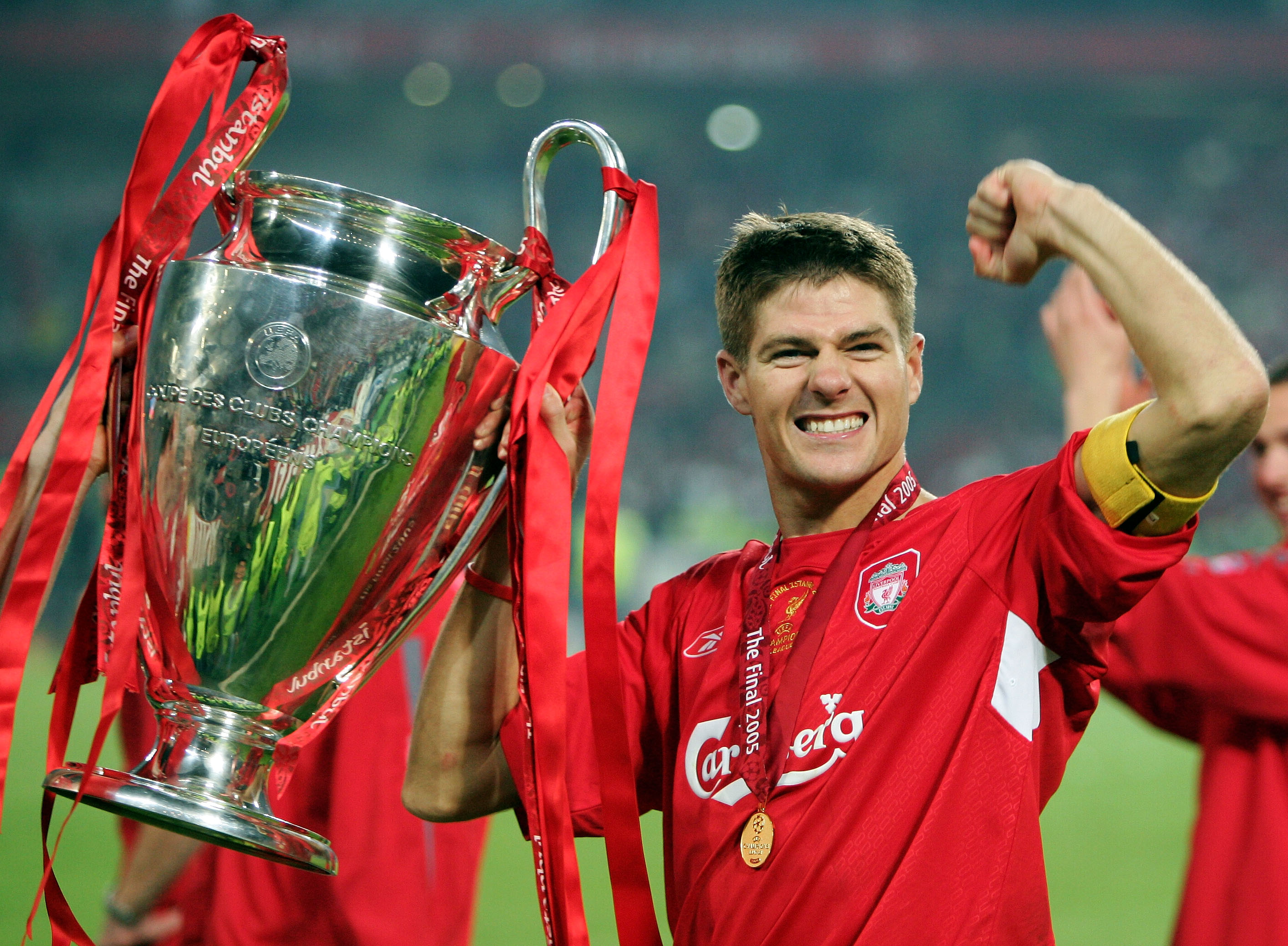
'Clutch' is a sports term many soccer fans outside of the U.S may not be familiar with. It's definition however, of an athlete delivering the goods in those moments when the clock is ticking and the pressure is high, very much is.
Soccer history is made up of such players. Those who consistently have been there when their team needed them most, to others whose clutch moments may have been confined to a tournament or single game but proved so valuable nonetheless.
In no particular order, representing club and country, here are the 50 most clutch players in soccer history.
Do you agree with the players that made the list? Are some not worthy of their inclusion or is there someone inexcusably missing out?
Steven Gerrard
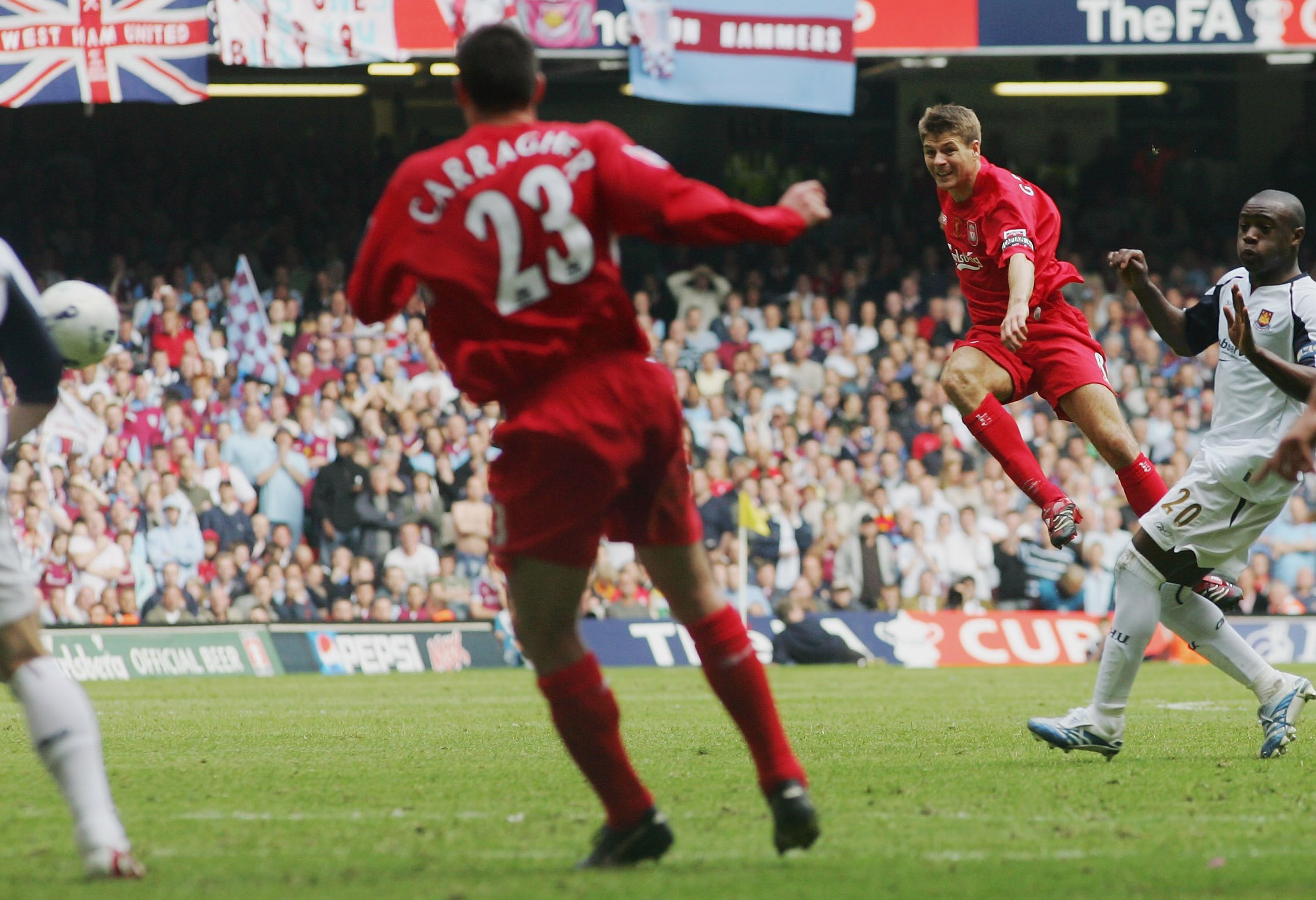
It is intriguing to wonder how Liverpool Football Club would have fared over the past decade without Steven Gerrard, such has been the value of the contributions made by their skipper.
Gerrard has cemented his legendary status on Merseyside with an ever reliable consistency. The more he progressed as a player the more unquestionable a prospect a Liverpool team without him in it seemed.
The finest demonstration of the England international's clutch credentials came in one of Liverpool's finest campaigns, the 2004/05 season that saw them win a fifth European Cup.
Their success in the Champions League that season may not have come at all if not for Gerrard's stunning late winner against Olympiakos in the group stage saw them qualify from Group A in second place.
Gerrard's finest hour came in the final itself against AC Milan. Having gone 3-0 down in the first half the Liverpool captain pulled a goal back on 54 minutes and helped inspire a ten-minute spell that saw Liverpool bring it back to 3-3. Extra-time and penalties were eventually needed to win, but Gerrard deserved his man of the match award that night as he played a key role in salvaging what looked a lost cause.
It would not be the last time Gerrard helped stop silverware from slipping from his team's grasp. A year later in the FA Cup final against West Ham he scored a perfectly struck long-range effort to equalise and take the game to extra-time before his side once more won on penalties.
Paolo Rossi
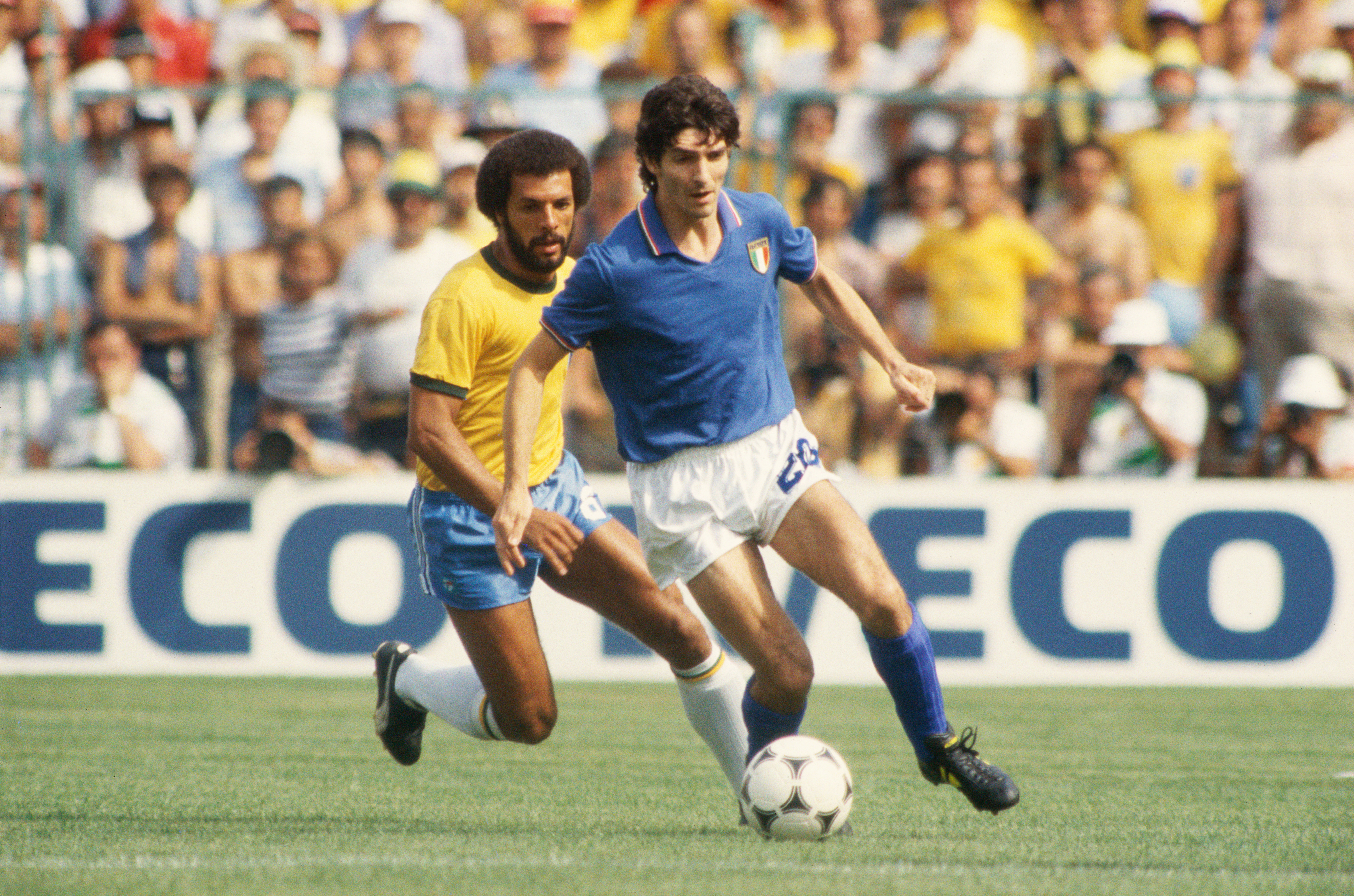
If ever a player was defined by their rise from zero to hero it was Paolo Rossi.
The Italian striker was banned in 1980 for his alleged involvement in the Totonero betting scandal. After it was overturned and national team manager Enzo Bearzot included him in his squad for the 1982 World Cup, an out of form and seemingly uninspired Rossi struggled to repay his coach's faith in the tournament's opening games.
After defeating Argentina 2-1 the Azzurri needed to beat what some argue was the second best Brazil side of all time, including such talents as Zico and Socrates, to progress from their second round Group C into the semi-finals. Rossi chose this moment to rise to the occasion, scoring one of the World Cup's great hat-tricks.
The Juventus forward opened the scoring after five minutes, then restored Italy's lead after Socrates had equalised. Falcao brought Brazil level in the second half but Rossi would not be stopped and got his third and Italy's winner with just over 15 minutes left.
Rossi proved he was no one-game wonder and added another brace in the 2-0 semi-final win over Poland and opened the scoring as Italy beat West Germany to win their third World Cup.
When his country needed him most Rossi was there.
Peter Schmeichel
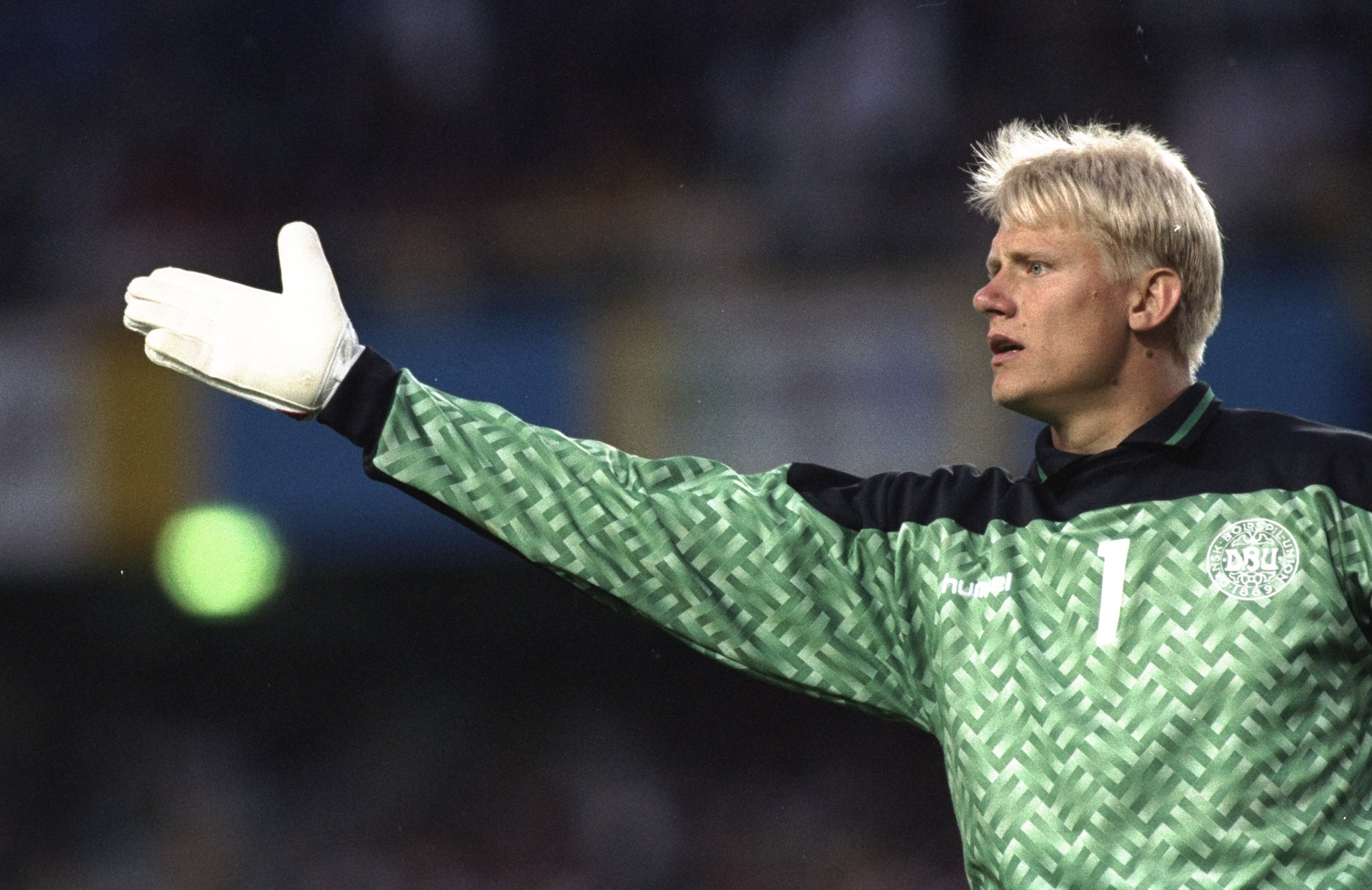
It is often noted that the greatest testament to the value of Peter Schmeichel to Manchester United was the difficulty Sir Alex Ferguson had in finding a replacement who could live up to the standards set by the great Dane.
Schmeichel was possibly the best last line of defence in football throughout the 1990s. Those teams who could find a way through United to test him were met with the fierce resistance of a goalkeeper who would stop at nothing to keep them out.
While blessed with strong teams in front of him at Old Trafford, at Euro '92 Schmeichel had to work that little bit harder for the talented but undeniably underdog Denmark. In what would become one of international soccer's great upsets he played a vital part.
A semi-final penalty shoot-out save from Marco Van Basten took them through to the final where Schmeichel pulled off some vital saves to hold Germany at bay, Denmark coming out 2-0 winners.
Jurgen Klinsmann
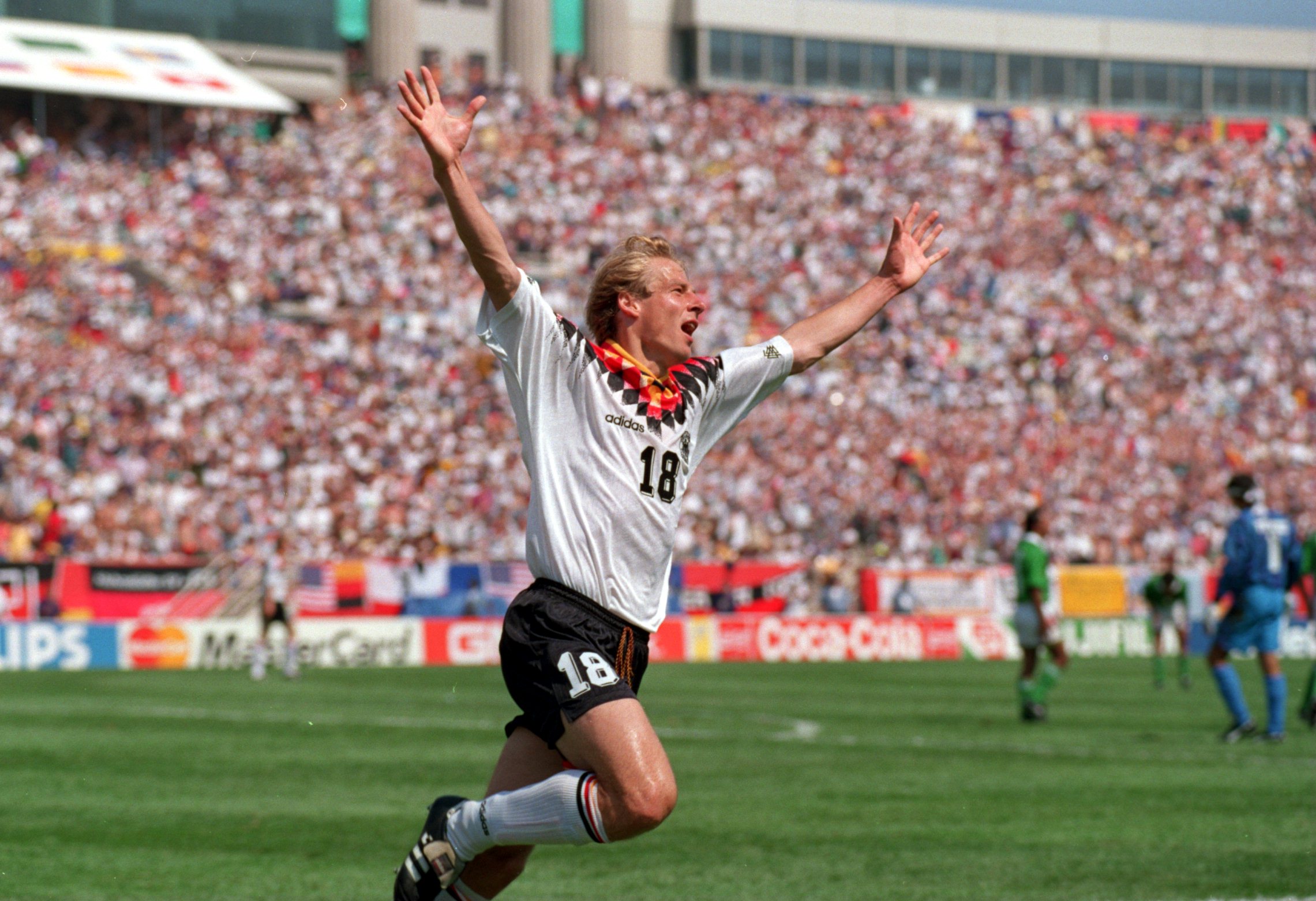
One of the most clinical finishers of the 1980s and 1990s, Jurgen Klinsmann scored goals wherever he went. What made him one of the world's great strikers was a work ethic and determination to involve himself in the match, attributes that made him a valuable go-to-guy for club and country.
On the international stage Klinsmann was a perennial tournament scorer for (West) Germany. He was their top scorer at the 1994 World Cup and scored twice as he captained his country to the 1996 European Championships crown.
It was at Italia '90 where Klinsmann most ably demonstrated his value besides his goalscoring. In their second round meeting with Holland, both sides were reduced to ten-men early on with West Germany losing the services of Rudi Voller. Despite now being up-front on his own Klinsmann remained a constant threat, giving the Dutch defence the run-around and grabbing the Germans' first goal in a 2-1 victory.
Klinsmann was also there when a former club needed help. Facing relegation in the 1997/98 Premier League campaign, Tottenham Hotspur took their former striker on loan from Sampdoria. The German helped galvanise a struggling Spurs side and fired them to safety, a memorable four-goal haul away at Wimbledon proving the highlight.
Sir Bobby Charlton
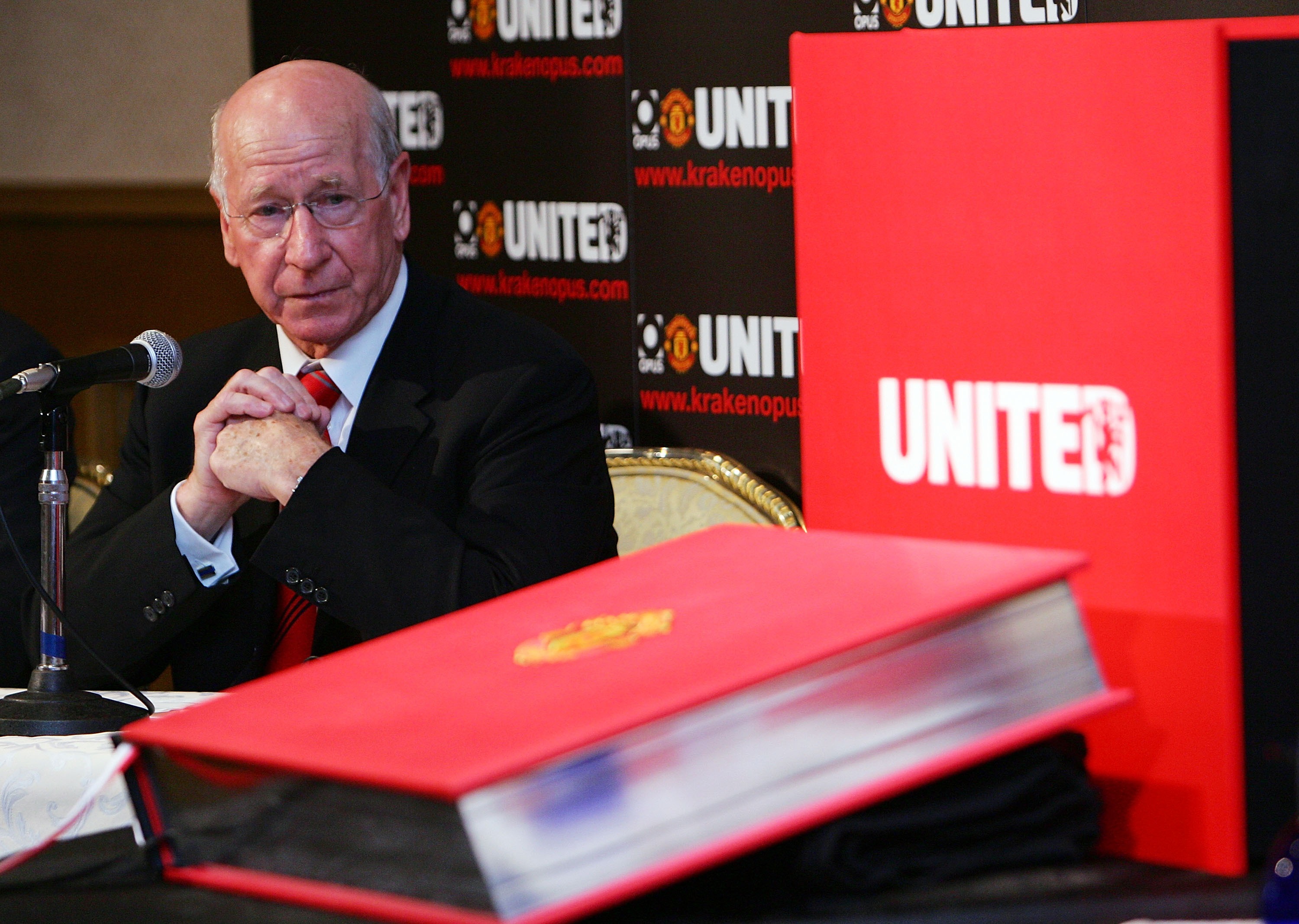
Sir Bobby Charlton's career was one characterised by both tragedy and triumph. He was one of English football's greatest footballers, and underlying his great talent was an understanding of how to utilise it where it was most needed.
It came in the form of his return to the Manchester United first team not long after Munich as he played his part in the brave but ultimately unsuccessful run to the 1958 FA Cup final. A decade later at Wembley it was represented in the form of two goals as United defeated Benfica 4-1 to win the European Cup.
In the 1966 World Cup final it came in the form of sacrifice.
On the grandest stage of all England manager Alf Ramsey asked Charlton to resist his attacking impulses and influence the game in a more subtle but just as valuable fashion. Ramsey asked him to mark West Germany's star man Franz Beckenbauer.
It was one of the less remarkable stories of a thrilling 4-2 England victory, but one as vitally important.
Andrés Iniesta
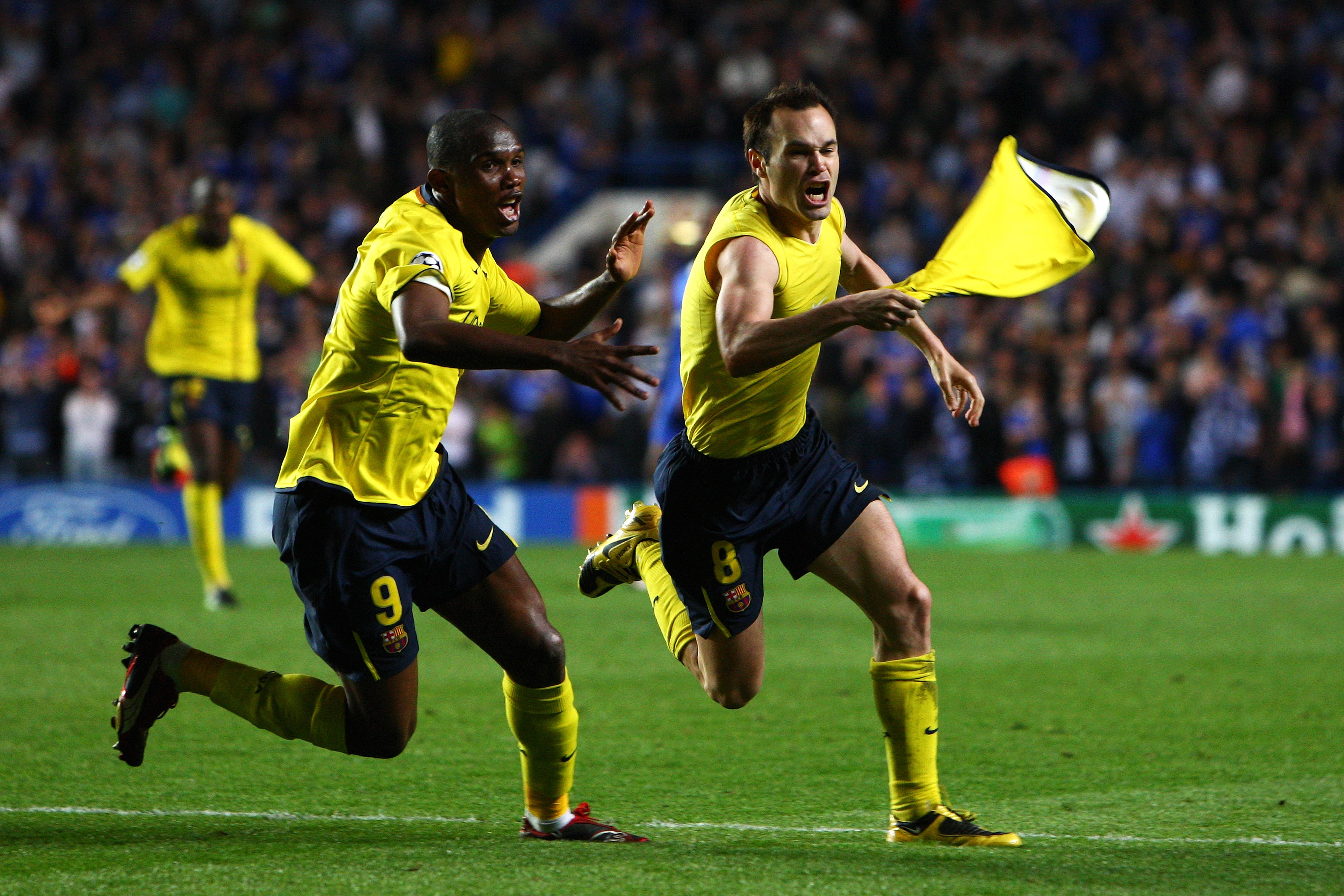
As part of what many view as the best club and international sides in the world today, Andrés Iniesta has demonstrated his importance to both Barcelona and Spain through an understanding of his requirements in the scintillating brand of football both look to employ.
Just as crucially he has proved himself a clutch performer when things have not entirely gone their way too.
In Barcelona's Champions League semi-final away leg versus Chelsea in 2009 the Catalan outfit found themselves 1-0 down and lucky to still be in the tie with a few minutes remaining, getting the benefit of several shocking refereeing decisions. If football is about taking your chances when presented to you, Iniesta did so that night.
Positioning himself in space on the edge of the Chelsea box, an opportunity duly came Iniesta's way with a pass from Lionel Messi. Sweetly striking the ball with the outside of his right boot he directed it beyond the reach of Petr Cech, taking Barca through to the final on the away goal rule.
As if to reiterate his value in the big games, Iniesta also scored Spain's extra-time winner in the tense, closely-fought 2010 World Cup final with Holland.
Gheorghe Hagi
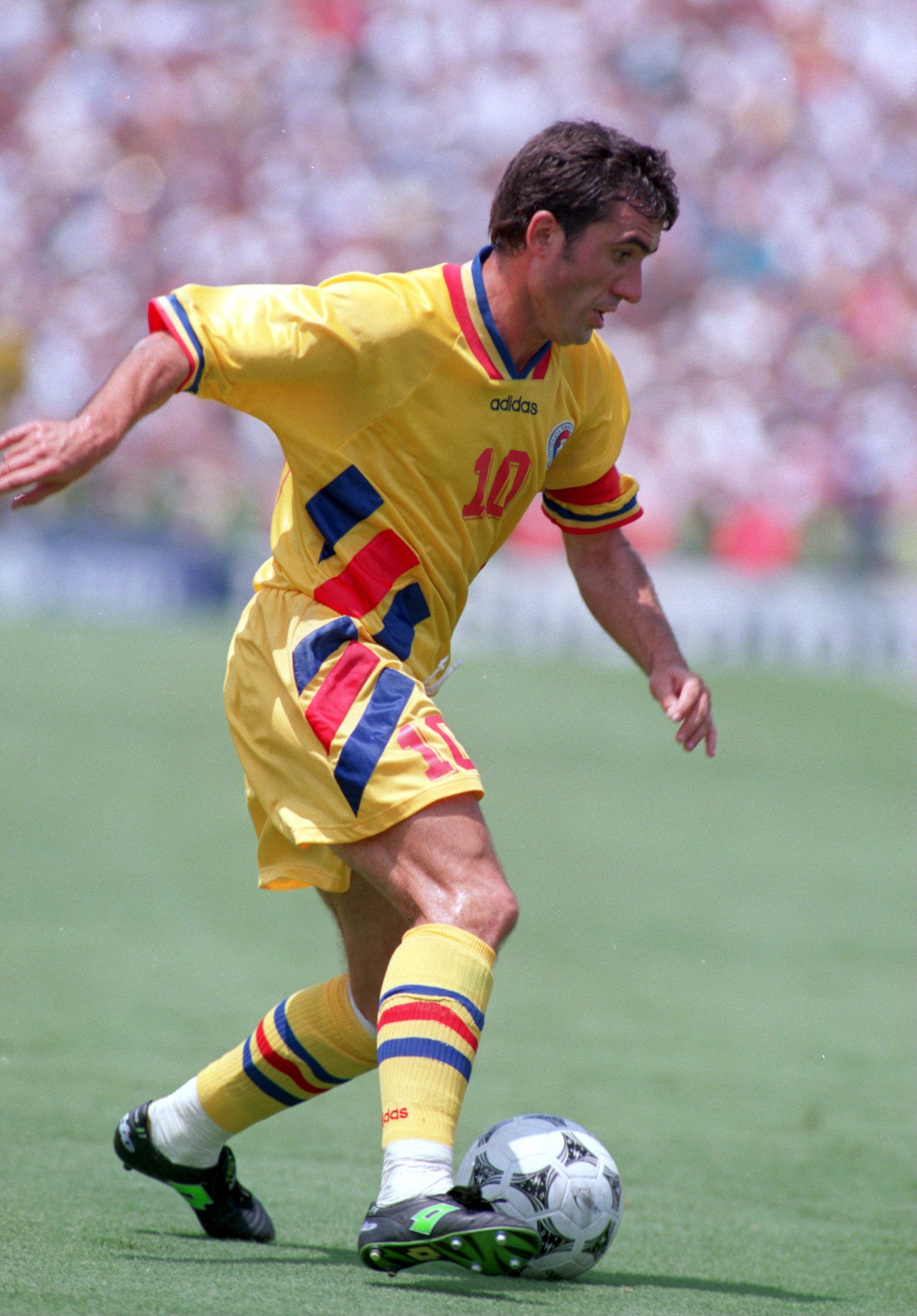
Wonderfully gifted, Gheorghe Hagi would likely find his way onto any list consisting of the best players to ever play soccer.
'The Maradona of the Carpathians' earns his spot on this particular list through most notably his role in Romania's memorable run to the quarter-finals of the 1994 World Cup.
Romania were more than just one player in 1994, but it was Hagi who lifted them beyond the status of a decent team to a legitimate contender in the tournament. Leading them through the group stage they earned a second round meeting with an Argentina team stripped of the services of their own icon Maradona, but still suitably well equipped.
Hagi put the seal on a memorable 3-1 victory, running from inside his own-half to finish a devastating counter-attack. He also scored in their 5-4 penalty shoot-out loss to Sweden in the next round.
At club level Hagi enjoyed a well-travelled and successful career, renewing his leadership qualities in his swansong at Galatasaray to guide them to four Turkish titles as well as the 2000 UEFA Cup and UEFA Super Cup.
Bert Trautmann
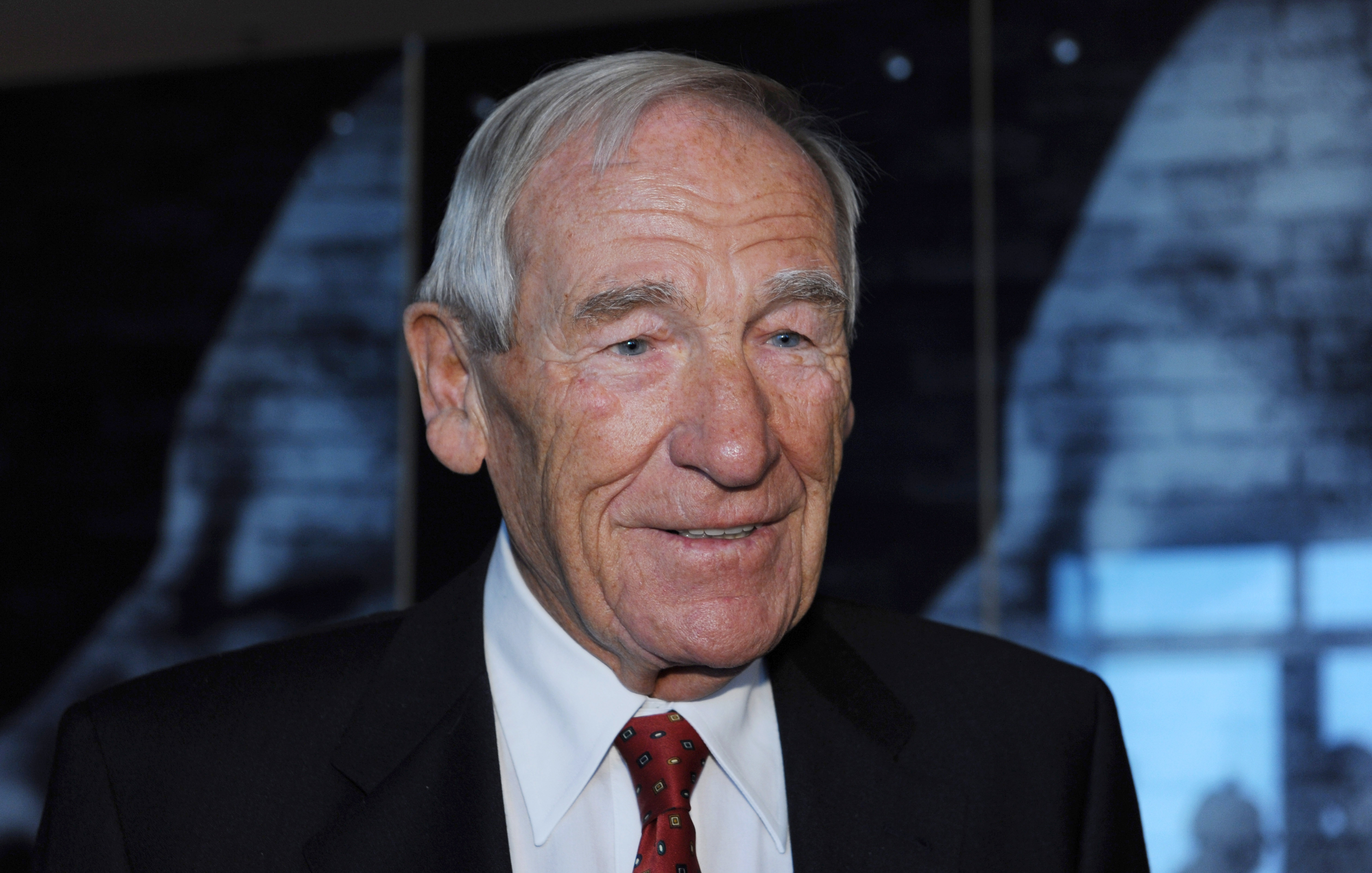
Bert Trautmann is one of the less well-known names on this list. While there are several reasons that make his story so remarkable, there is one in particular that more than earns him a spot among the 50 most clutch soccer players of all time.
The German goalkeeper was a prisoner of war in Britain who following World War Two opted to remain in the country. In 1949 he joined Manchester City, having won over elements of the city initially hostile to his joining he stayed with the club until 1964.
During the 1956 FA Cup final against Birmingham City, Trautmann rushed forward from his goal to make a save at the feet of the oncoming Peter Murphy. In the course of the challenge the German broke his neck.
Oblivious to the seriousness of the injury (he could have just as easily been paralysed or killed) Trautmann played the remaining 16 minutes and pulled off a series of saves to protect Man City's 3-1 lead as they went onto win the cup.
Franco Baresi
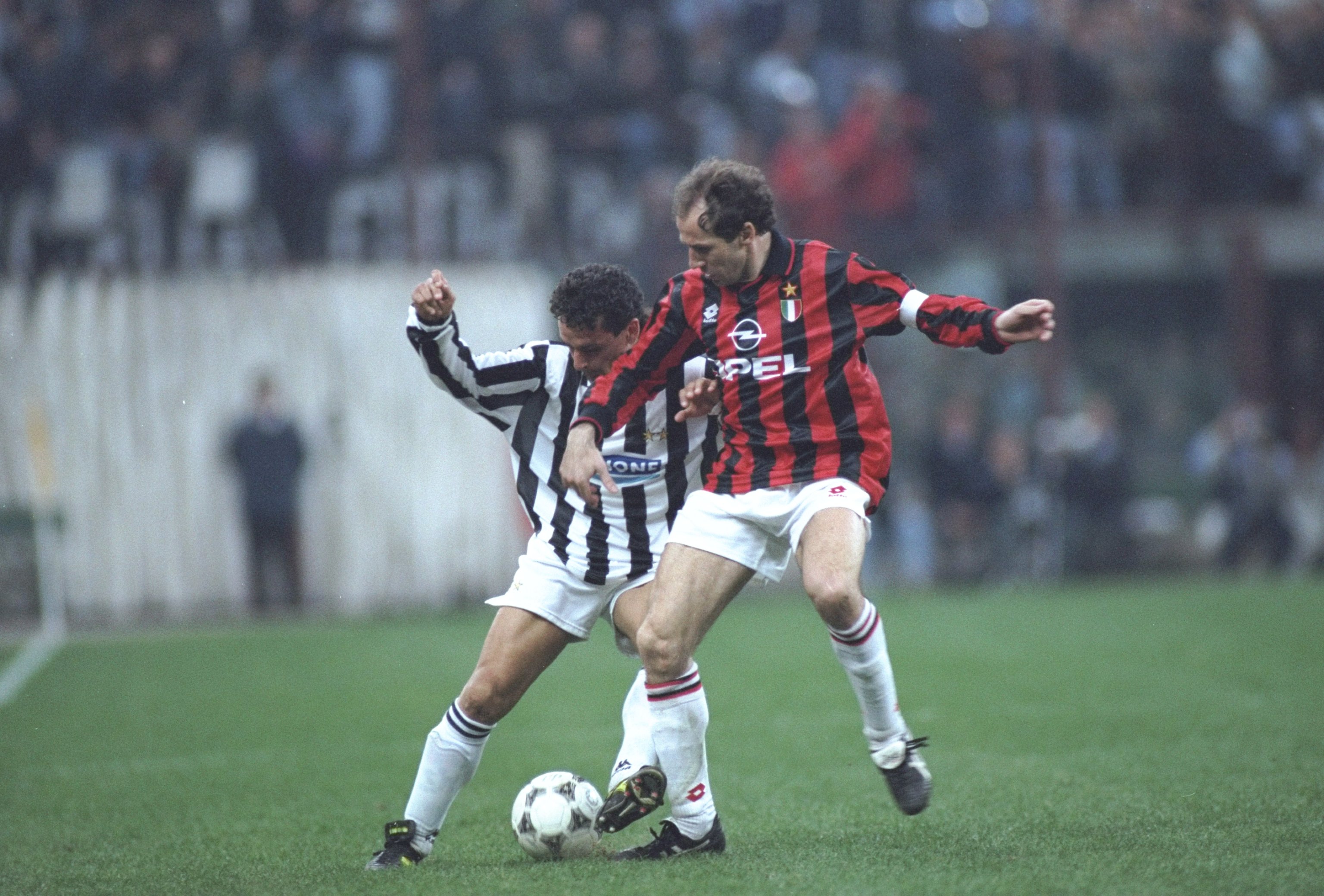
In the late 1980s and early 1990s AC Milan were blessed with some of the most remarkable attacking talent in football. There is no doubt they would have not been as successful as they were if not for the rock-solid foundation of a defence they were built upon, at the heart of which was Franco Baresi.
Measuring the clutch contributions of defenders is not so simple as it for many attacking players on this list who can be noted for goals and assists in game-changing moments. For defensive players their contributions are measured in the heroic rearguard fights to keep out such talent.
Baresi did this for the best part of 20 years at AC Milan, when for a good while Serie A boasted the most skilful and dangerous attackers in world football, players the calibre of Platini, Baggio and Maradona (not to mention his role in their successful forays into Europe).
As the veteran in a back-line that would include future Rossoneri stalwarts like Paolo Maldini and Alessandro Costacurta, the sweeper Baresi guided his defensive partners in restricting shots and chances against them while often turning these into the deadly attacks perfected by those who played in front of him.
Didier Drogba
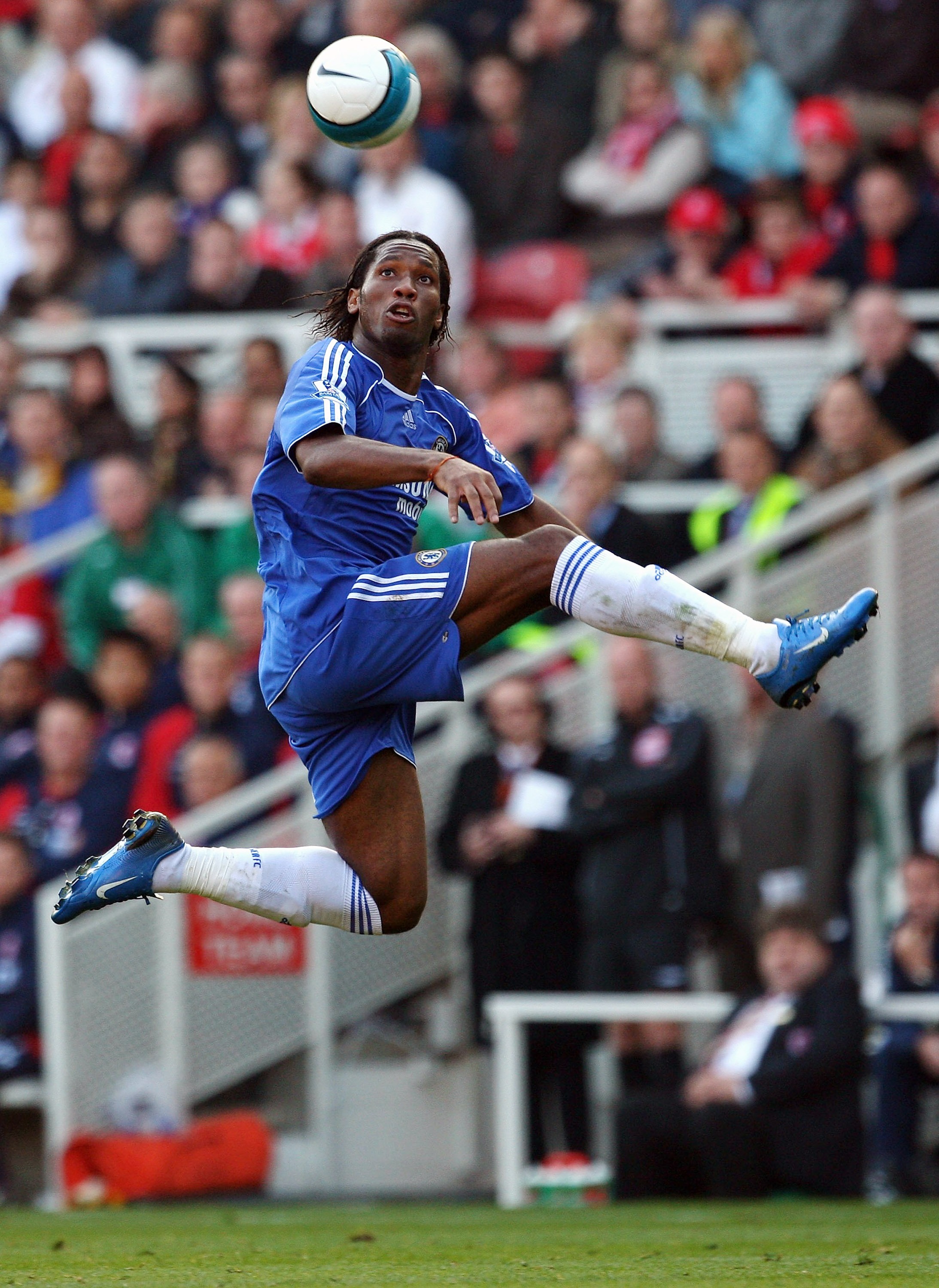
Regardless of whether you like Didier Drogba or not, it is near impossible to not rate him as one of the best strikers of the modern era. Just as much as his physical strength and lethal power, his reliability in big games has come to define him as a player.
Drogba has been a regular scorer in games against Chelsea's perennial rivals, both home and abroad he has recorded decisive strikes against Arsenal, Manchester United and Barcelona. In addition, in all five of Chelsea's recent domestic cup successes he has been on the scoresheet.
This included a brace in the Ivorian's man of the match performance in the 2-1 Carling Cup win over Arsenal in 2007 and the winning goals in the FA Cup finals of 2007 and 2010, against Man United and Portsmouth respectively.
Zinedine Zidane
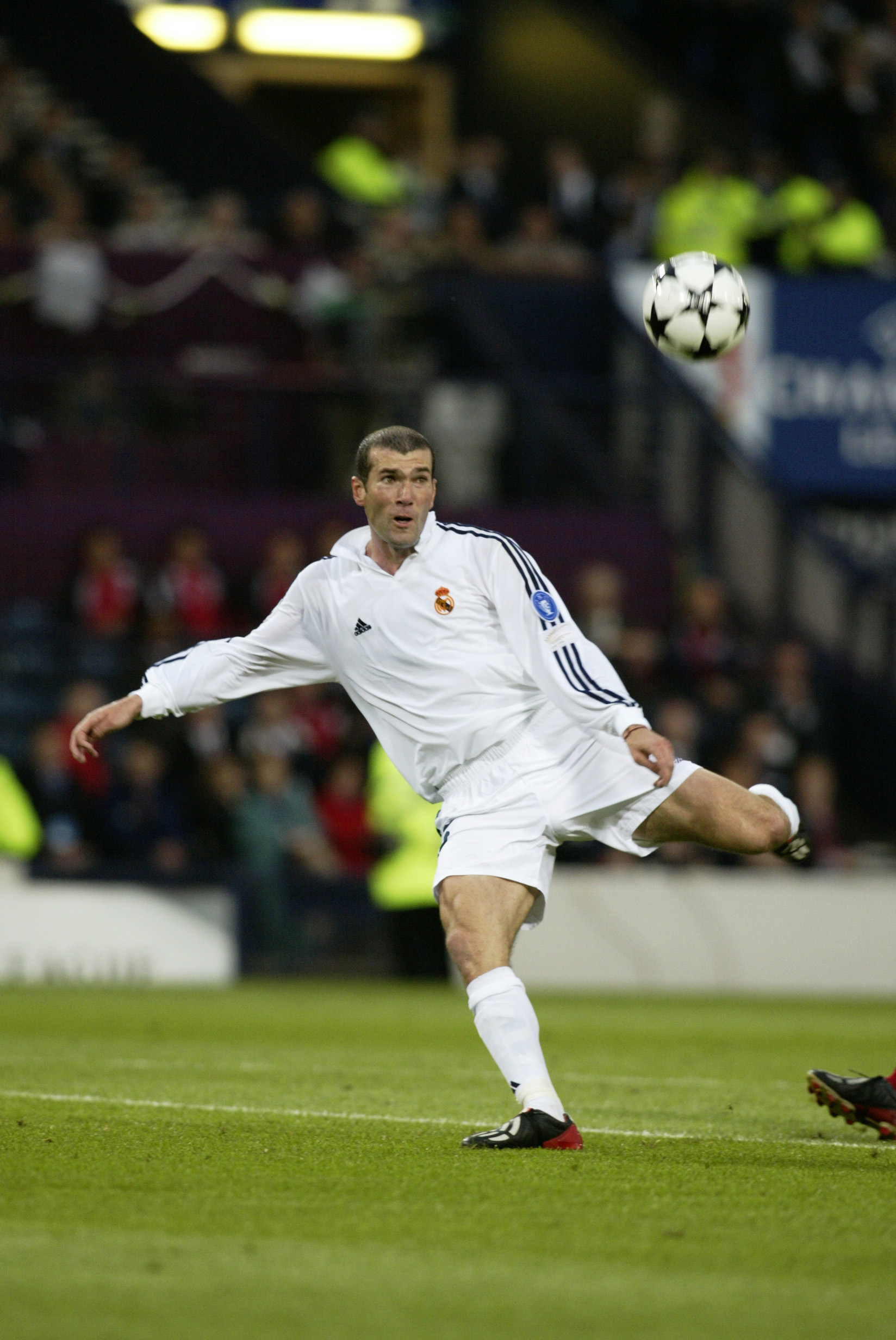
On the biggest stage of all Zinedine Zidane suffered what may be the most famous meltdown in soccer history. Shrouded in the red mist he responded to an alleged personal jibe from Marco Materazzi by headbutting the Italian defender and leaving his France side down to ten-men as they fought to win their second World Cup.
This may be the image now forever associated with the career of the genius Frenchman but it was not representative of a player unable to handle pressure. In that tournament already he had helped propel his country to the final, under the feeble management of Raymond Domenech he was all but labelled France's de facto leader.
Though prone to occasional submissions to the red-mist, Zidane rarely let it cloud him in big-game situations. He rose far beyond that on home-soil in the 1998 World Cup final with two goals in France's 3-0 win over Brazil.
Having missed out on winning the Champions League twice before with Juventus, in 2002 he hit one of the most elegantly struck volleys ever to score the winner in Real Madrid's 2-1 defeat of Bayer Leverkusen.
Ole Gunnar Solskjaer
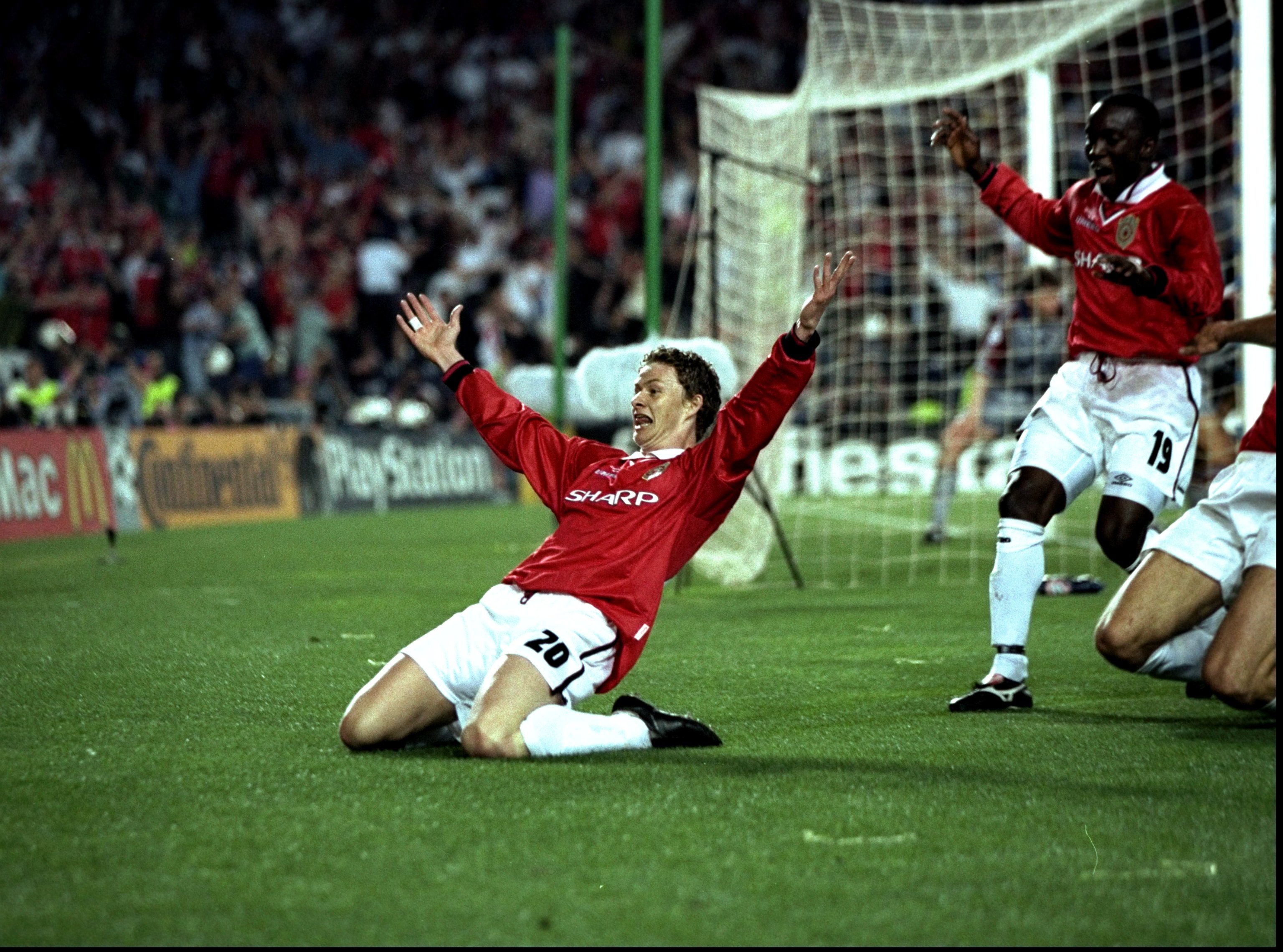
Ole Gunnar Solskjaer scored 126 goals in his eleven years with Manchester United. It is an impressive tally when considering at various points throughout his time there he competed for one of two spots up-front with such renowned forwards as Andy Cole, Teddy Sheringham, Dwight Yorke and Ruud Van Nistlerooy.
The Norwegian was never guaranteed a regular starting place in Sir Alex Ferguson's team but he understood the value of what he offered his manager. He was trusted to score goals whether it was in the first half or stoppage time.
The latter occurred most famously in the 1999 Champions League final. Just moments after Sheringham had drawn United level against Bayern Munich, having not long came on Solskjaer displayed his goalscoring instinct to get on the end of his team-mate's flick on and achieve the most dramatic of victories.
Teddy Sheringham
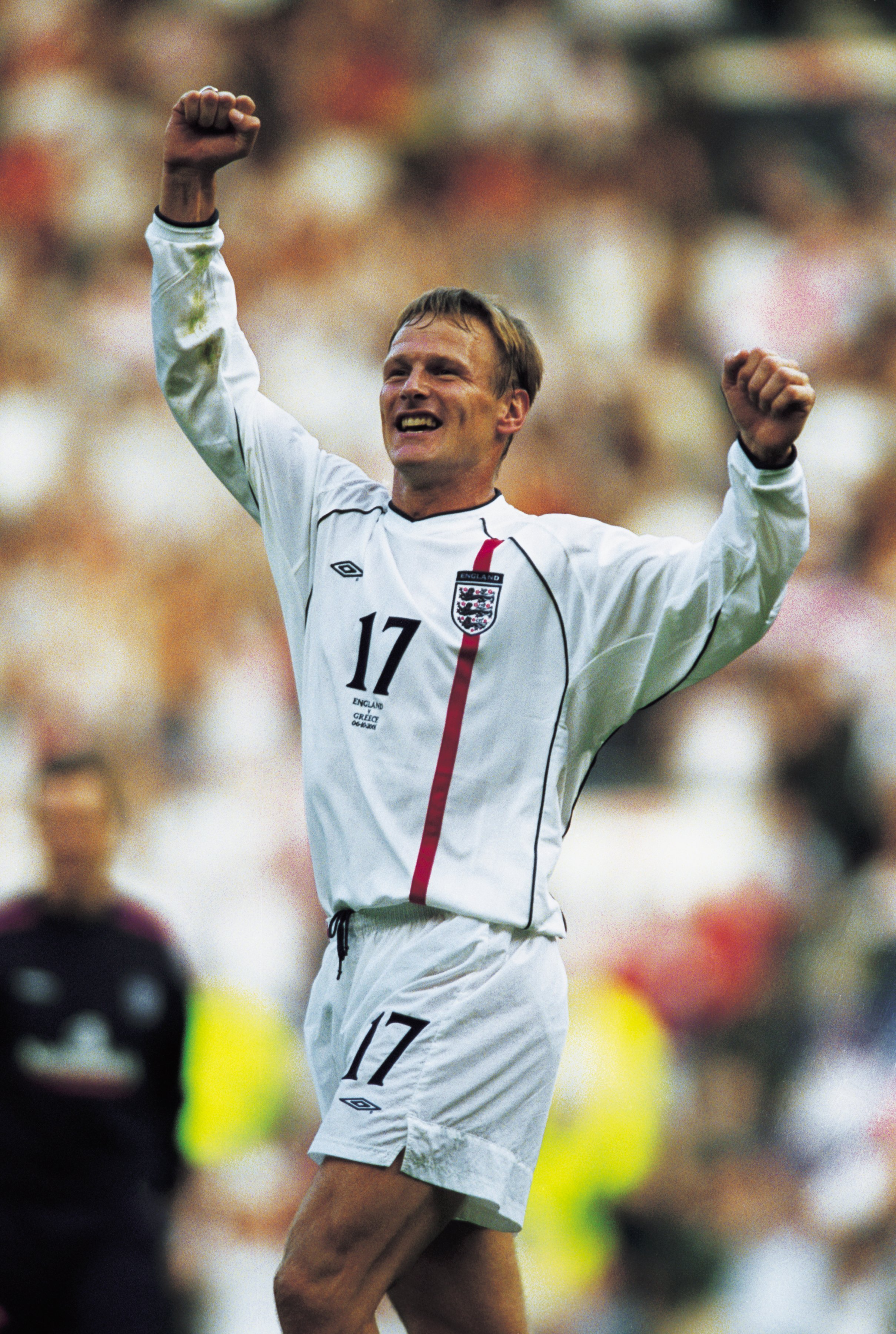
As mentioned in discussing Ole Gunnar Solskjaer, Teddy Sheringham too came through in the clutch for Manchester United as they won their second European Cup in 1999.
Like Solskjaer, Sheringham had faced limited first-team opportunities that year as Dwight Yorke and Andy Cole developed one of the most feared strike partnerships in the Premier League. Having moved to United to win silverware he was not about to give up on his ambitions and when given his opportunity he came through for his team.
Sheringham's goal and assist in the final came in a game the Red Devils had struggled to get hold of. Two years later Sheringham would do similar for England as they attempted to qualify for the 2002 World Cup.
At Old Trafford England were struggling to find a way past a stoic Greece side despite the heroic efforts of David Beckham (more of later). A goal down, Sheringham once more came on to score an equaliser with a header on his first touch. Greece went back in front, but if you look when a certain free-kick was scored, Sheringham makes a run in front of the line of vision of Greek goalkeeper Antonios Nikopolidis at a point where he may have been able to make a judgement on the shot's direction.
Subtle but telling, a perfect summation of Sheringham the footballer. Now more on that free-kick...
David Beckham
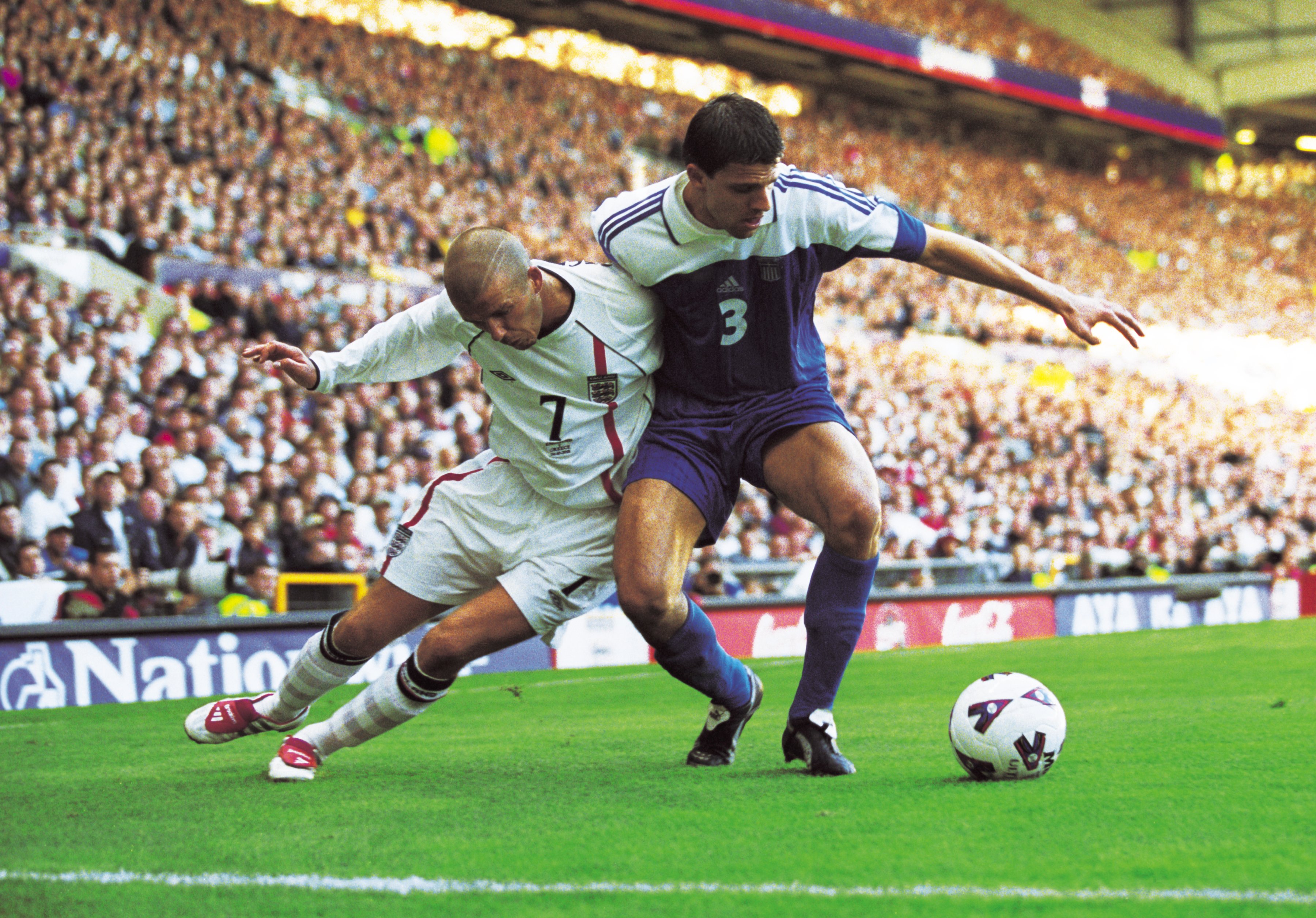
This writer has found a lot to criticise about David Beckham over the past decade. But on 6 October 2001 against Greece, England's young captain gave a true definition of leading by example, putting in a performance of such heroic effort that few before or since have matched.
Unable to comprehend a Greek gameplan that restricted space and opportunity, England struggled throughout to create and for spells were outplayed by their opponents.
As his team-mates floundered Beckham fought to stop the game slipping away. He chased and closed down, his tireless running being one of the fewer challenges the Greeks faced all day. Beckham carried his team and country on his back, and when one final chance came to give them automatic qualification for the World Cup, he took it. The midfielder had missed free-kicks already that day, but he stepped up one last time and delivered.
Beckham won trophies and has enjoyed other great moments in his famous career, but at Old Trafford that day he played his finest match.
Diego Maradona
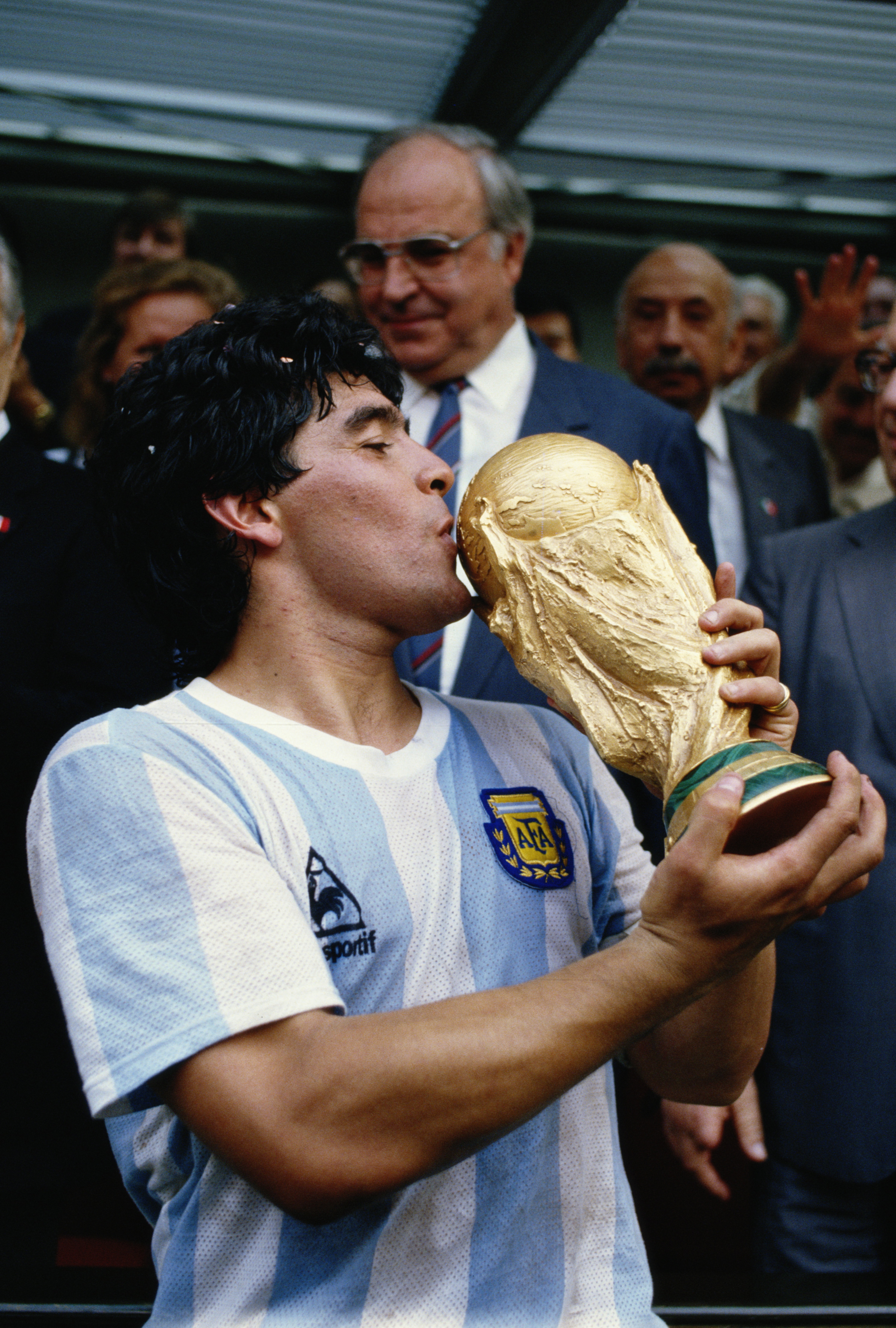
Debating the greatest footballer of all time is a futile task. There are several arguments each for Pele, Cruyff, Mardona etc, and each have their own respective campaigners.
It so happens that the evidence for Maradona is also a big reason for his placing in this top 50.
The claim that El Pibe de Oro (the Golden Boy) single-handedly (no pun intended) won Argentina the World Cup in 1986 is unfair to a squad that all played their part. But compared to other great World Cup teams — Brazil '58 and '70, Holland and Germany '74, France '98 — the Argentineans as a whole do not match up as well save for their captain.
Maradona was in inspirational, often extraordinary form throughout that tournament and was undoubtedly the difference in their progress through a tough run in their final three games against three good opponents in England, Belgium and West Germany.
The diminutive attacker performed a similar role at Napoli and among the highlights won two Scudettos (1987 and 1990) and the UEFA Cup (1989). Maradona's achievements here were arguably greater as these successes came at a time when Serie A was the strongest league in the world while Napoli were previously without a title in their history.
Again, he was teamed with fine players like Bruno Giordano and Antônio Careca (the trio formed the famed 'Ma-Gi-Ca' frontline), but Maradona was the instigator of this much longed-for success in Naples.
Francesco Totti
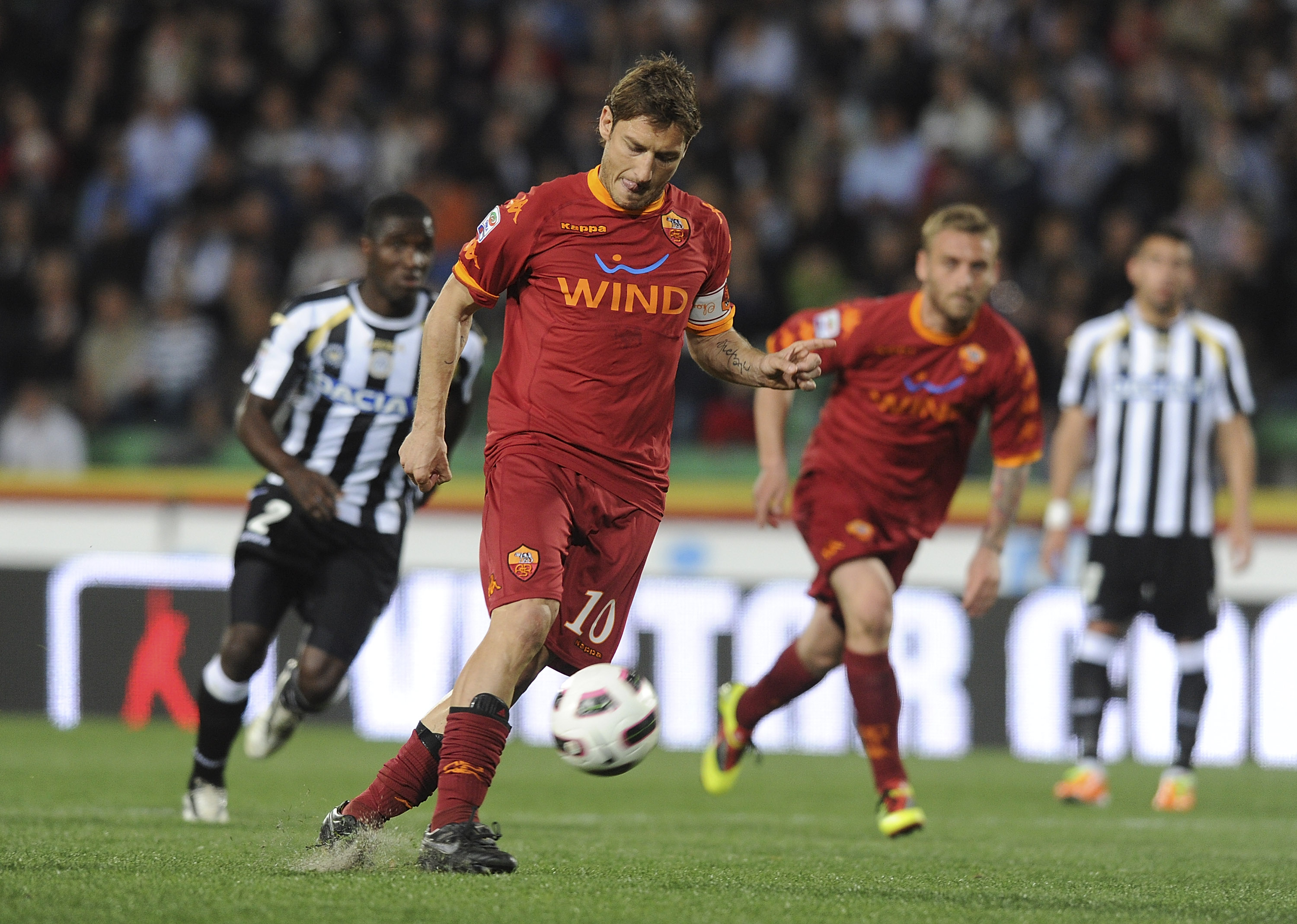
Besides an impressive Euro 2000 and some good moments in Italy's 2006 World Cup victory, Francesco Totti's did not quite enjoy the type of international career his talent warranted.
Totti's entry on this list is due to his consistency and ability to adapt over a tumultuous decade or so for Roma, where in the face of financial problems and several changes of manager and formation he has played a major role in keeping them a contender in Serie A.
This is an achievement not to be underestimated. After playing a major role in winning the Scudetto in 2001, Totti remained at the club as they struggled to match to the financial muscle to attract top players, and with it, success of the Milanese two AC and Inter.
In particular during Luciano Spalletti's time at the club, Totti was pushed forward in the positional sense as the solitary 'striker' in the former's new 4-2-3-1 formation. The Giallorossi captain effectively performed two roles — retaining the involvement required of his previously deeper position while also acting as the frontman in which his teammates revolved around.
It would be a difficult task for the best of players, but Totti responded with the best goal returns in his career (winning the European Golden Shoe in 2007) as Roma launched a lone stand against the dominance of Inter. That they managed to push them close for the title and even snatch two Coppa Italias from their grasp in 2007 and 2008 was one of Italian football's great achievements in the past decade.
Michel Platini
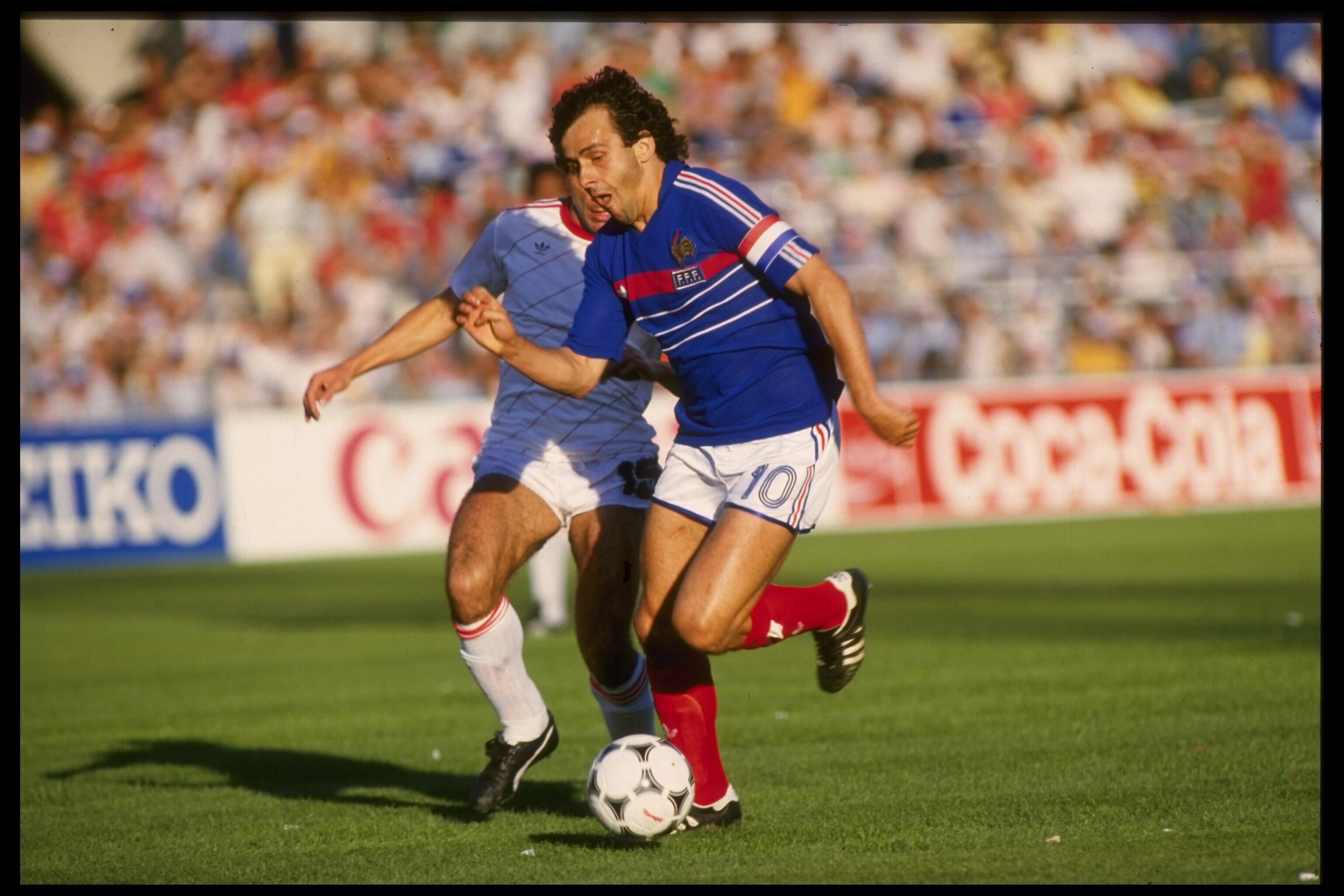
Before Zidane, France had Michel Platini.
The two legendary Frenchman of two different eras share similarities in their respective successes both for France and Juventus, and for each being one of the most skillful and watchable players of their time.
In 1984 Platini inspired France to their first major trophy, the European Championship, with some tremendous performances. In Group A he scored the winner against a strong Denmark and an impressive hat-trick in a 3-2 win over Yugoslavia.
In perhaps their toughest test of the tournament, their semi-final with Portugal, Platini scored the extra-time goal that took them through to the final after Jean-François Domergue had put them level five minutes earlier. The final saw him score the opening goal in the second-half of an until-then nervy encounter.
Alfredo Di Stéfano
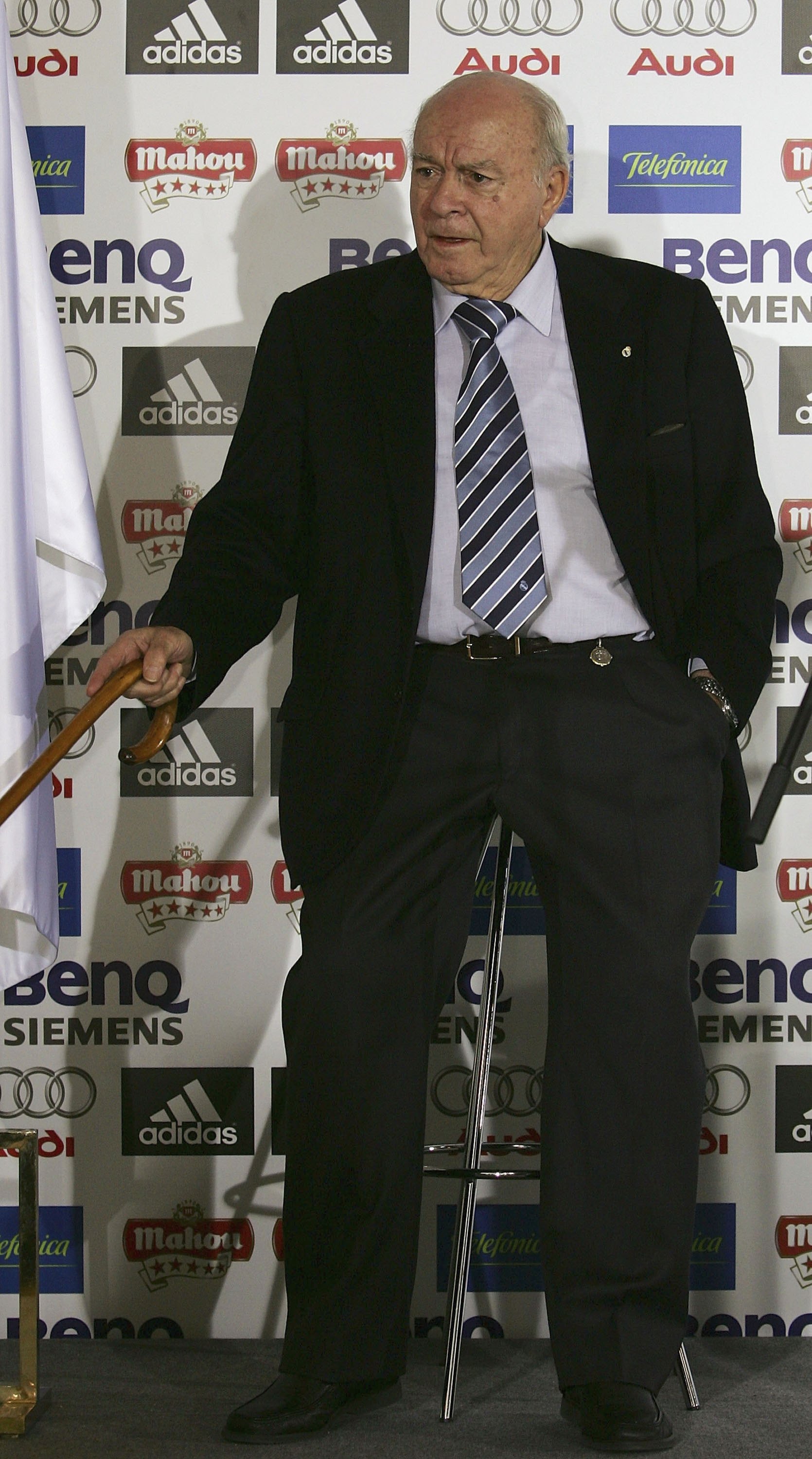
By now you may have noticed that many of the most clutch soccer players of all time are also unsurprisingly some of the greatest to have played the game in general. That ability to produce in big game situations and when they were needed most is a trait, that lets be honest, makes them so good in the first place.
Alfredo Di Stéfano is no exception here.
While European Cup football was an altogether different beast back in the late 1950s and early 1960s, it had quickly become one of the biggest occasions in club football. That Real Madrid won the competition in its first five years was a startling achievement.
Perhaps even more so was Di Stéfano scoring in each of those finals. It cemented his status as one of the best ever, with in particular his hat-trick in the 7-3 dismantling of Eintracht Frankfurt in 1960 a performance still spoken of in hushed tones to this day.
Park Ji-Sung
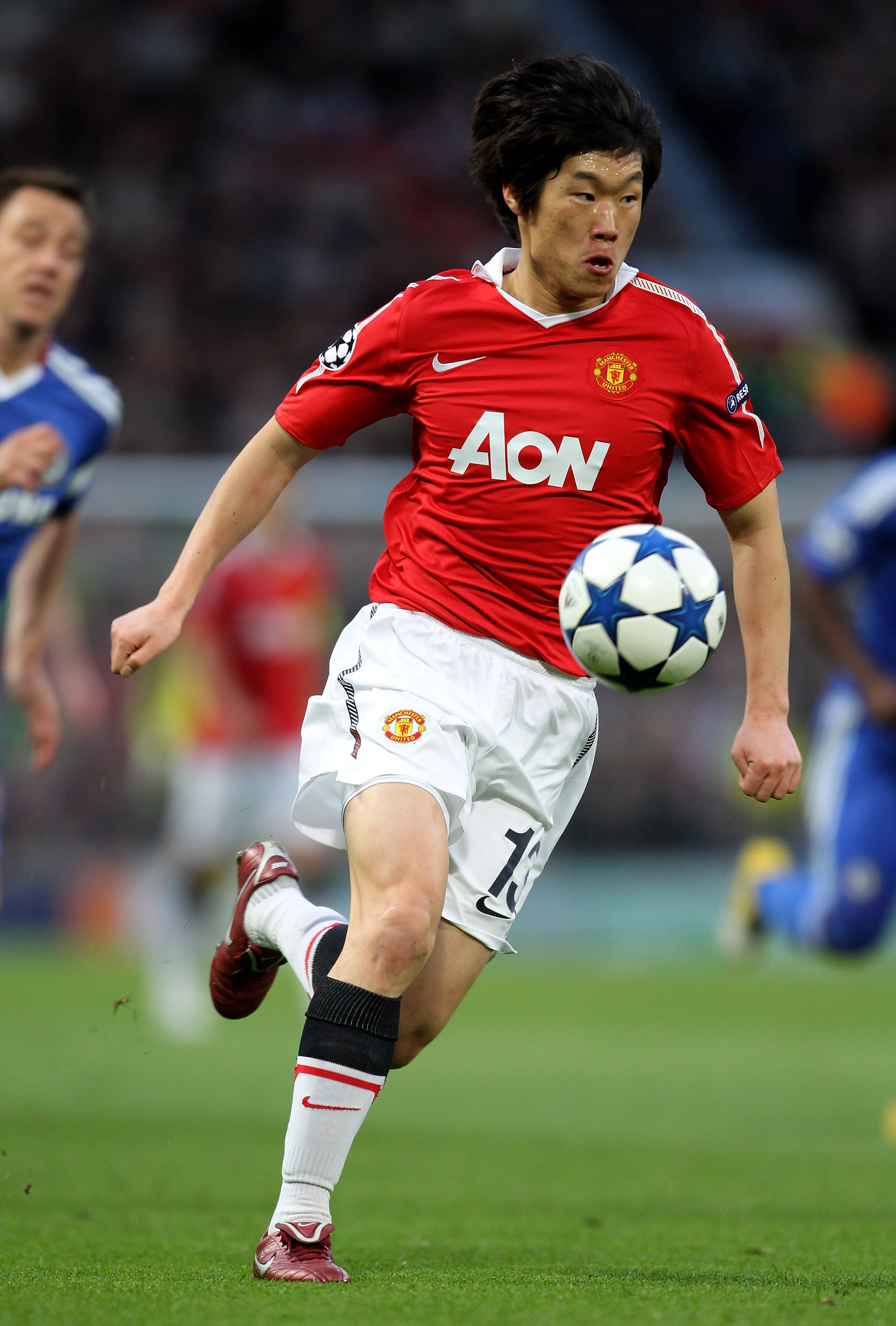
Park Ji-Sung has becoming something of a go-to-guy for Sir Alex Ferugson when it comes to selecting his side for big games.
The Korean international is not a regular starter for Manchester United but is capable of slotting into the team when his manager needs him, responding with important goals and energetic displays where he has rarely withered under the limelight.
These performances have earned him a reputation as one of United's most reliable players. Park enhanced it further with the decisive goal against Chelsea just as the Blues threatened a comeback in their Champions League quarter-final meeting.
Park has proved just as clutch at international level. In South Korea's memorable 2002 World Cup he eliminated Portugal at the group stage with the game's only win then in 2006 scored an equaliser against France.
Patricio Urrutia
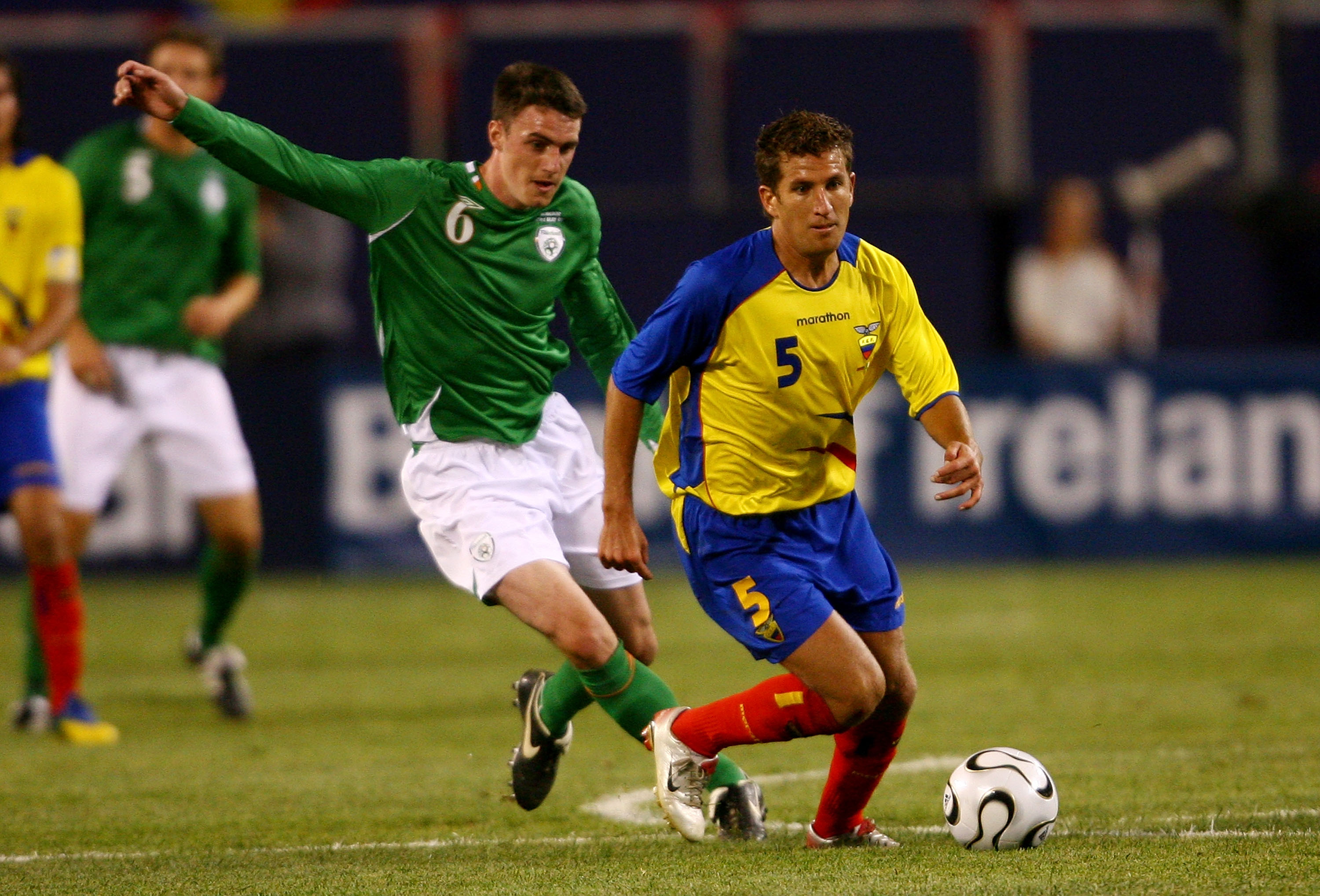
One of the less well-known names on this list, Patricio Urrutia earns a spot for the major role he played in recording a significant piece of recent Copa Libertadores history.
In 2008 LDU Quito became the first Ecuadorian club to win the South American equivalent of the UEFA Champions League with their triumph over Brazil's Fluminense. Urrutia scored seven goals during the campaign.
The midfielder scored Quito's fourth in a 4-2 first-leg win at home at the Estadio Casa Blanca. Back in Brazil, Fluminense won 3-1 and the final went to penalties after a goalless period of extra-time.
Urrutia scored his most important goal of the tournament and cemented his status as one of Quito's star players with their first penalty of the shoot-out as they went onto win it 3-1.
Helmut Rahn
Such was the fearsome reputation of Hungary at the time, when West Germany beat them 3-2 in the 1954 World Cup final it was little wonder the match became forever known as 'The Miracle of Bern' in the hearts of German football fans.
The match also went some way to restoring the pride of a country shattered by World War Two, and a big reason for this was the performance of Helmut Rahn.
Known as 'Der Boss' for his leadership, Rahn equalised for West Germany after they had gone 2-0 down to a side regarded as the best in the world and boasting greats like Ferenc Puskás and Nándor Hidegkuti.
That the Germans were able to get on level terms and keep it that way for the majority of the match was a reason to be proud, Hungary having thrashed them 8-3 in the group stage.
Late on, Rahn turned pride into euphoria. Collecting the ball outside the penalty area, the forward shifted the ball onto his left foot, moved into the box and rifled it into the bottom corner beyond the dive of keeper Gyula Grosics.
Rahn's heroics won West Germany the World Cup, and himself a place in the hearts of Germans forever.
Sir Geoff Hurst
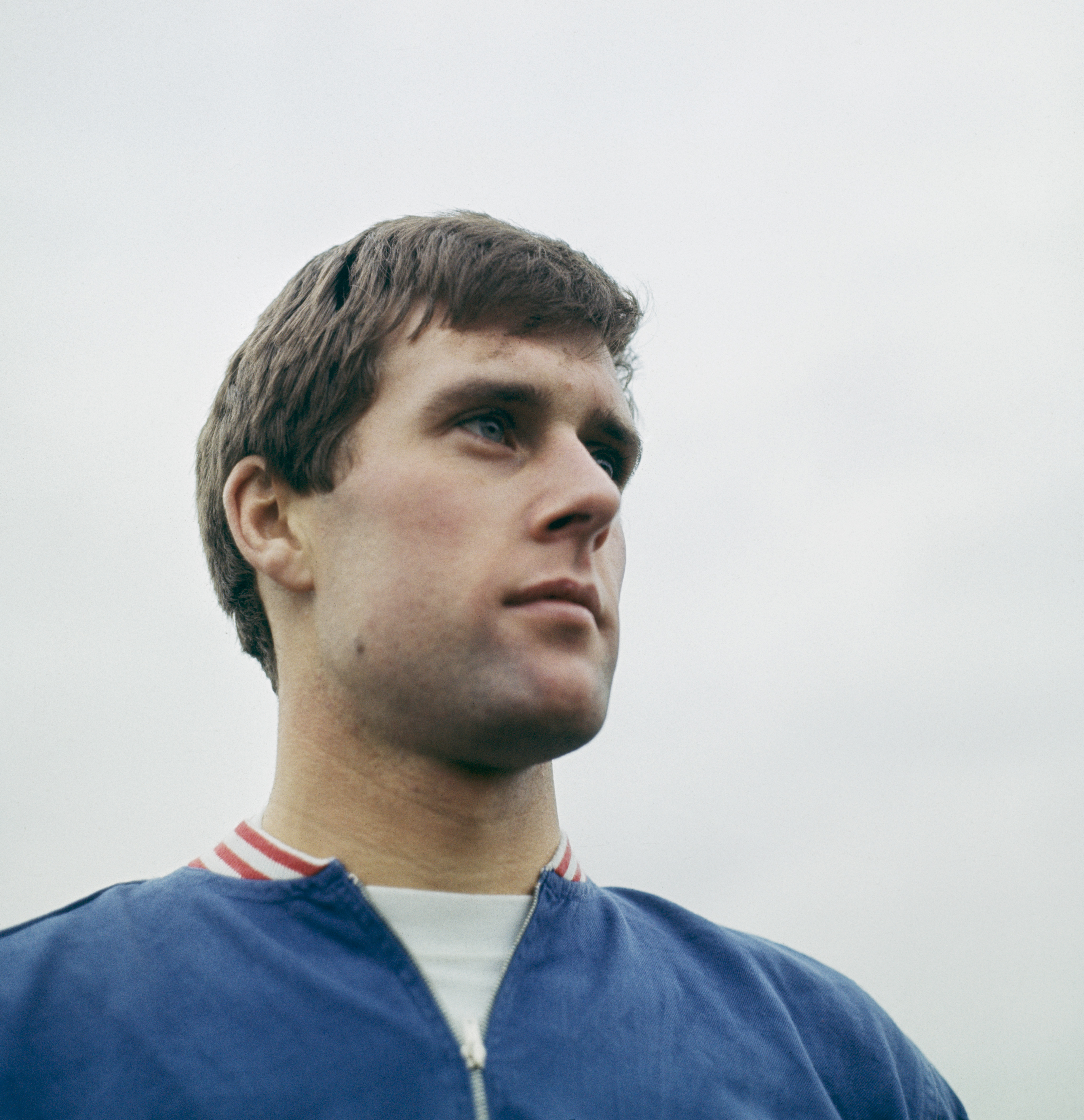
A completely fit Jimmy Greaves may have meant Geoff Hurst's name never entering the history books as the first man to score a hat-trick in a World Cup final. The former was the most prolific scorer in England at the time and could have walked into virtually any team in the world.
Greaves' misfortune meant Hurst got the nod to join Roger Hunt in attack, but truthfully for manager Alf Ramsey this was not a problem. He believed Hurst would adhere to the tactics planned for his team more than the mercurial Greaves.
Hurst responded with mature performances, leading the line well, and crucially scored four important goals on England's run to their only World Cup win. The first was in a bitter encounter with Argentina in the quarter-finals. The other three came in one of the most memorable finals of all time.
The West Ham striker brought England level after Helmut Haller put West Germany in front. As the game went to extra-time Hurst struck twice further to send England clear. His second was contentious, unclear whether it crossed the line. Hurst's third was emphatic, putting the seal on the game and a memorable contribution to English and World Cup folklore.
Cristiano Ronaldo
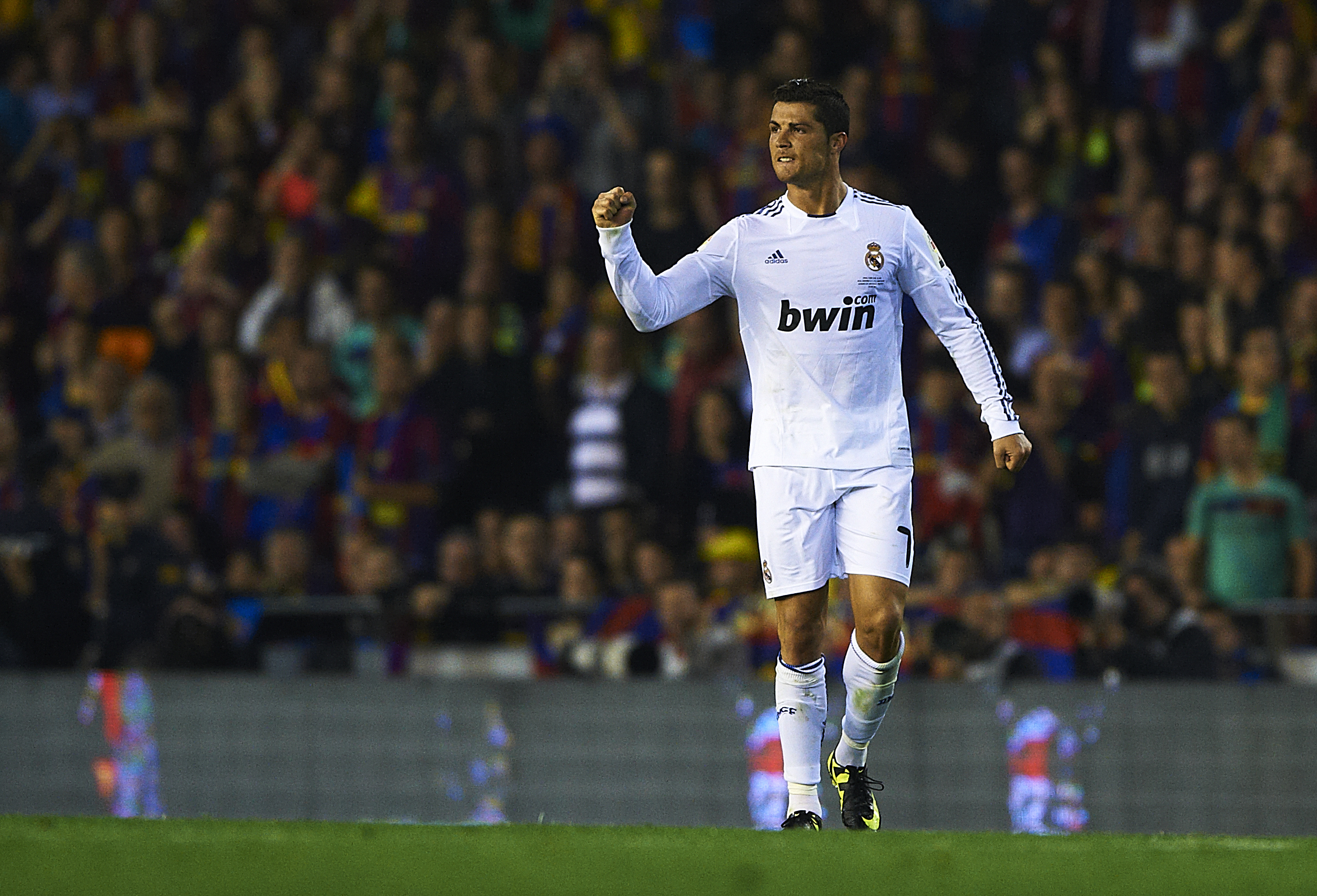
Does Portugal's inability to go the distance in major tournaments tell us something about Cristiano Ronaldo's ability to deliver when the pressure is on? After all, legendary players like Zidane and Maradona, men Ronaldo would hope to be classed with, helped inspire their nations to World Cup glory.
Well regardless of the influence they had on their respective successes, they were part of far stronger squads. Ronaldo has not had so much quality to play with, the level they have reached is just about in accordance with their talent level and besides he should have at least two or three tournaments in him to try and correct one of the few gaps missing on his résumé.
There is no doubting however the impact Ronaldo has had on both Manchester United and Real Madrid. Most notably over the course of his five years at United, the Portugese's consistent brilliance was a major reason for them fighting back at the potential dominance of Chelsea home and abroad.
It has not been so simple in La Liga where he has joined Real at a time when Barcelona are practicing brilliance on a near-weekly basis. But a well-taken headed winner in their recent 1-0 Copa Del Rey triumph was perhaps evidence that the former Ballon D'or winner may well be capable of instigating a fightback against their Catalan rivals.
Tony Adams
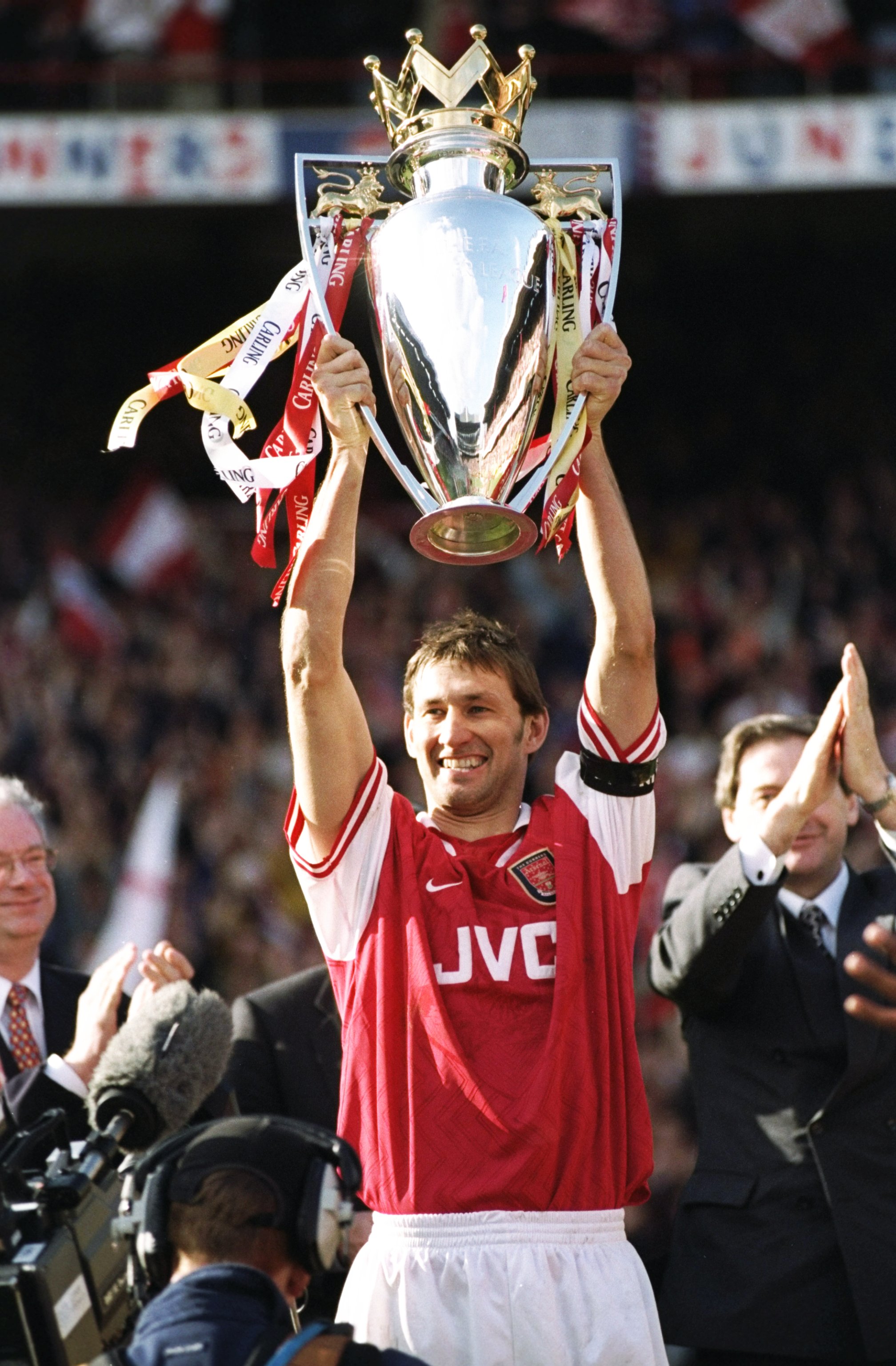
Tony Adams had been an integral part of Arsenal's success during George Graham's time in charge and played an arguably more important role in the early years of Arsene Wenger's reign.
The Arsenal captain's admission over his alcoholism came around the time Wenger was implementing new methods of training, preparation and style at Arsenal. That Adams bought into this was a pivotal moment in the blending of English and continental football cultures that was so fruitful for the Gunners.
Adams' leadership acted as a point of cohesion for the old guard core of Englishmen and the exciting new foreign talent Arsenal signed. In their 1997/98 double winning season he led them through their late-season run to the title and capped it off by memorably sealing their first place spot with a memorable goal against Everton.
It was his second double at Arsenal and he completed a hat-trick when he captained them in 2001/02. In between he had played a major part in various other successes including scoring a huge winner against North London rivals Tottenham Hotspur in an FA Cup semi-final in 1993.
Jan Tomaszewski
Jan Tomaszewski's legendary performance in the World Cup qualifier between England and Poland in 1973 effectively ended one era and begun another.
Needing to win England launched an onslaught of attacks which the Polish keeper met with save after crucial save (though he was also helped with some poor finishing). The barrage became even more desperate when Poland went 1-0 up Jan Domarski's shot had somehow crept underneath a despairing Peter Shilton.
England equalised through an Allan Clarke penalty but still needed a second goal to qualify. Tomaszewski and his defence stood firm as they kept it at 1-1.
Poland went on to finish at the World Cup next year, an achievement they would repeat in 1982 in the country's most successful soccer era. England sacked their World Cup winning manager Sir Alf Ramsey and did not return to the competition until 1982.
Filippo Inzaghi
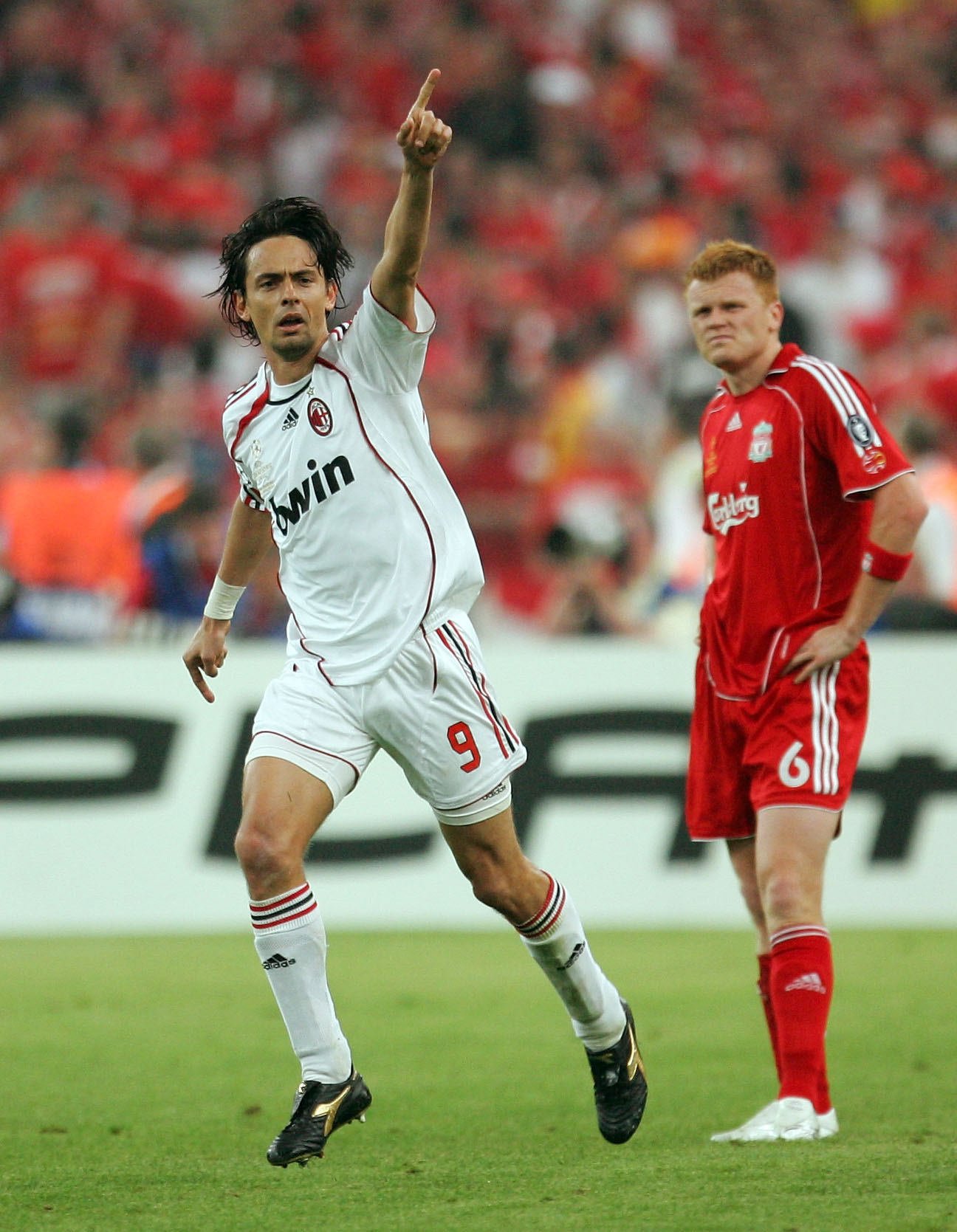
What Filippo Inzaghi does best is score goals, and over his career he has made a habit of doing it rather often.
Prolific for both club and country, home and abroad, and naturally many of those goals have proved crucial. None were bigger than his brace in AC Milan's 2-1 win in the 2007 Champions League final against Liverpool.
Having thrown away a 3-0 lead against the same opponents two years earlier the magnitude of this occasion for the Rossoneri should not be underestimated. Inzaghi was more than game for such a momentus night and he did what he does best once again.
No matter that the first of Inzaghi's two involved him getting in the way and deflecting Andrea Pirlo's free-kick in. He made sure he was in a position where he could make something happen and he did just that.
The second however was a demonstration of his calmness and prowess in finishing situations. He latched onto Kaka's through ball, rounded Pepe Reina and slotted it underneath the Spanish keeper.
Juninho Pernambucano
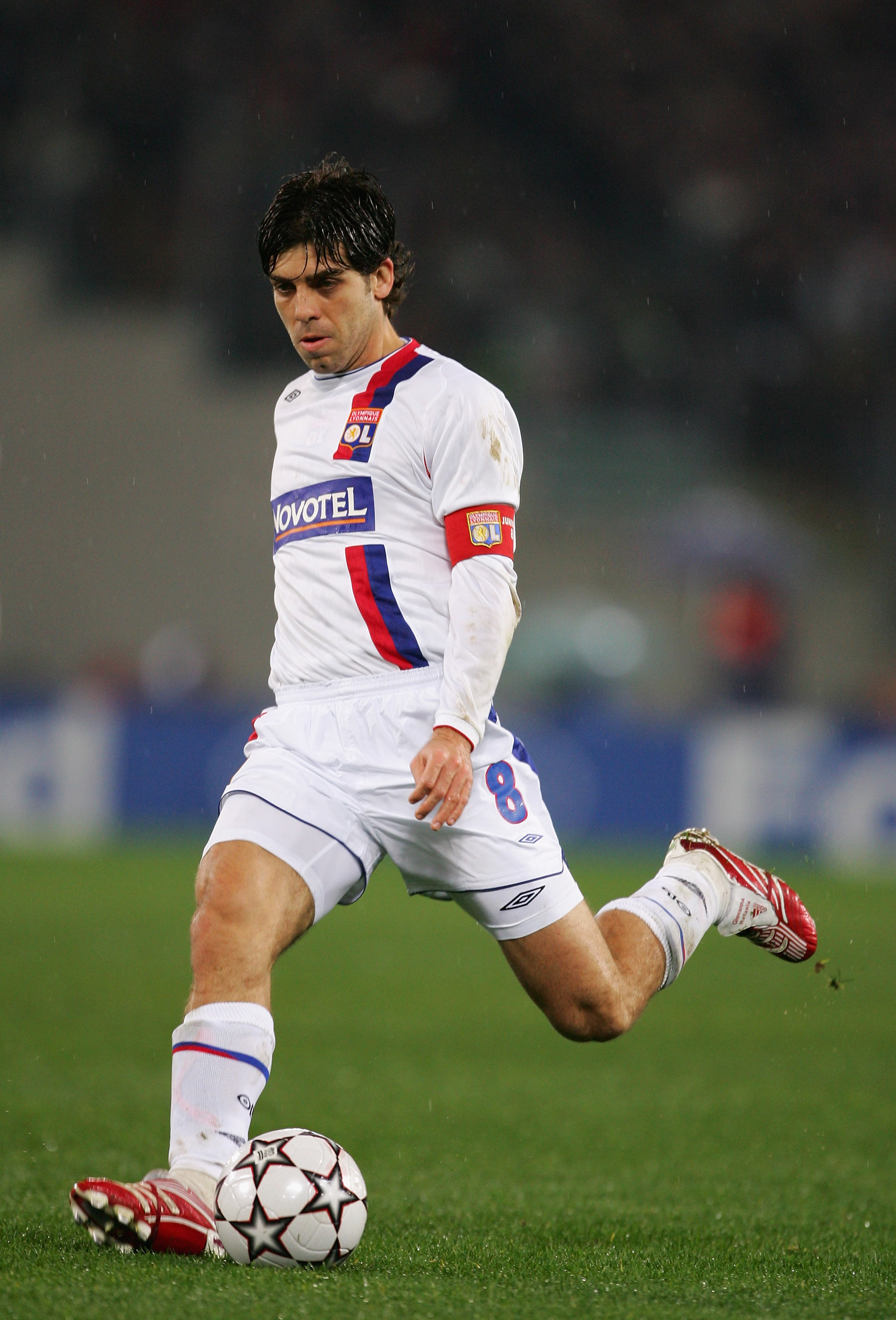
Lyon's dominance of French football over the past decade with seven consecutive titles from 2002 and 2008 was due in no small part to the contributions of Juninho Pernambucano.
There have been many so-called 'free-kick specialists' in soccer. Besides the near unparalleled variety and range of Juninho's, it was the startling consistency in which he scored them that marks him out.
Lyon put some good teams together over the course of their championship run but their Brazilian midfielder was of the main common factors throughout as they also enjoyed some runs deep into the Champions League in this period. As well as his many free-kick goals he was also an effective, tidy passer capable of setting up his team-mates and went onto captain Lyon too.
Antonios Nikopolidis
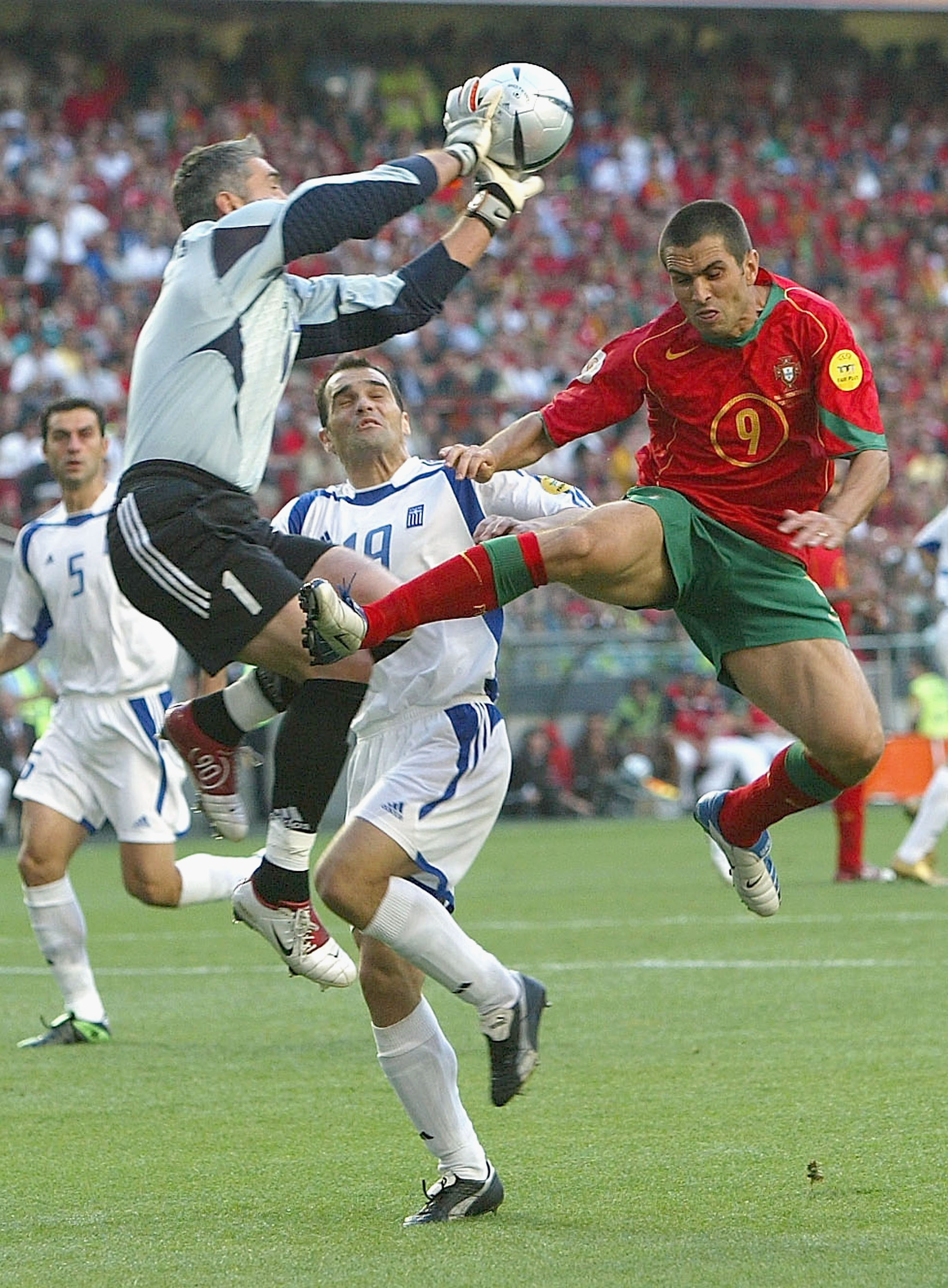
Greece pulled off one of the biggest upsets in football history when they won the 2004 European Championships.
While far from the most watchable or talented team in the tournament, their German manager Otto Rehhagel had formed a disciplined and defensively solid unit capable of grabbing chances when they came to them.
The foundation of this side was goalkeeper Antonios Nikopolidis.
The country's most capped player kept clean-sheets in each of the knockout rounds. No mean feat when considering Greece's opponents from the quarter-finals to the final were France, Czech Republic and Portugal, teams featuring an array of the world's best attacking talent.
Nikopolidis kept them all at bay and helped record one of soccer's great underdog triumphs.
Mario Kempes
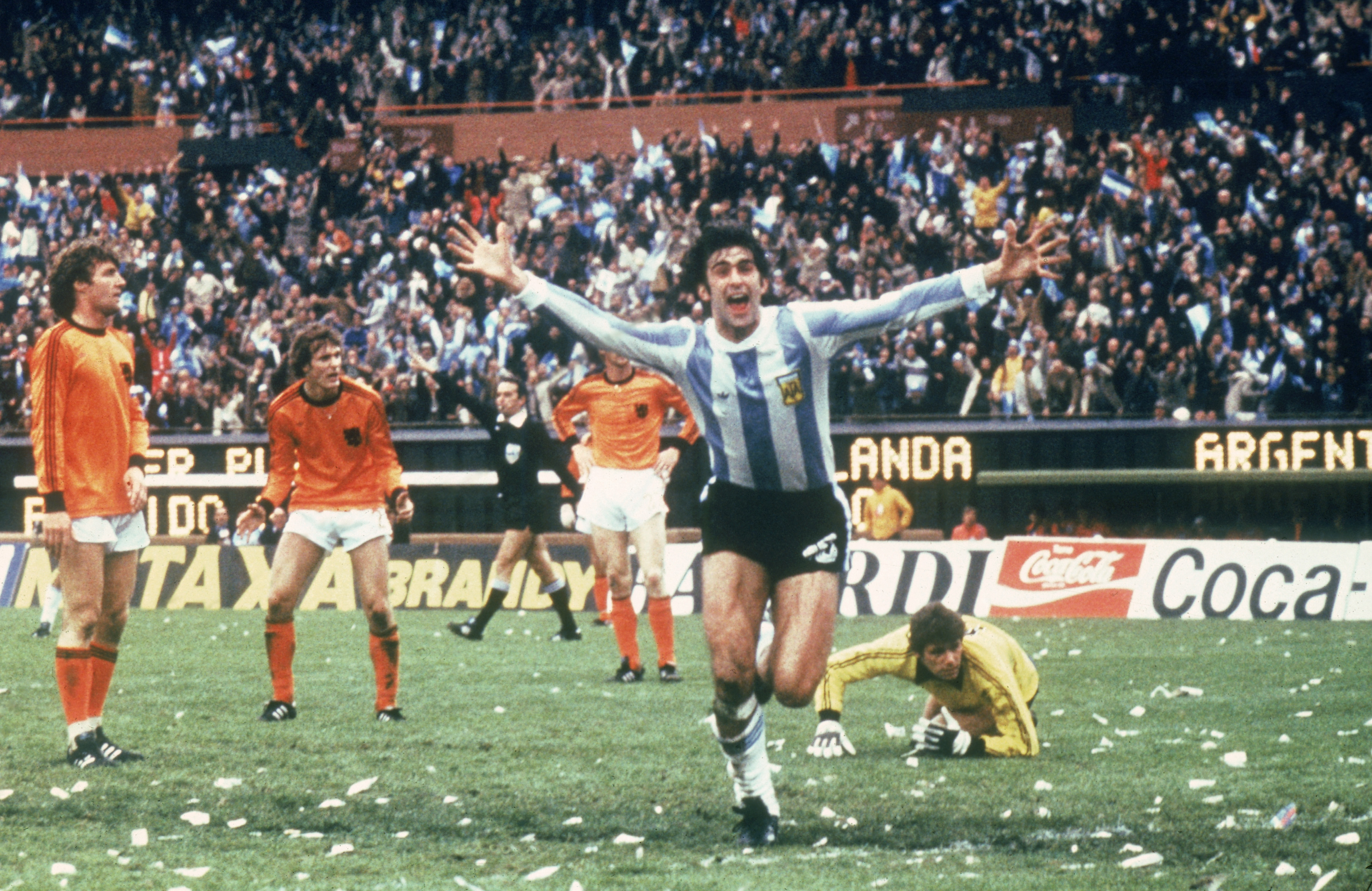
Mario Kempes went into the 1978 World Cup in the form of his life having finished top scorer in La Liga the previous two seasons for his club Valencia. Though it took him a little while to get going, the striker's goals proved crucial in Argentina winning their first World Cup. A victory all the more memorable for taking place on home-soil
Against relatively strong Poland and Peru outfits in the second round group stage, Kempes scored twice to take Argentina through to the final on goal difference ahead of South American rivals Brazil.
The final saw them meet a Holland side still blessed with some remarkable talent and a real threat to Argentina's World Cup dream despite the absence of Johan Cruyff. Kempes' opener was cancelled out by Dick Nanninga late in normal time but he was still to have a say in proceedings.
Just before the interval in extra-time he elegantly skipped past two two Dutch challenges before eventually scrambling it past Jan Jongbloed. It proved decisive and Argentina sealed the win with a Daniel Bertoni goal five minutes before the end.
Marco Van Basten
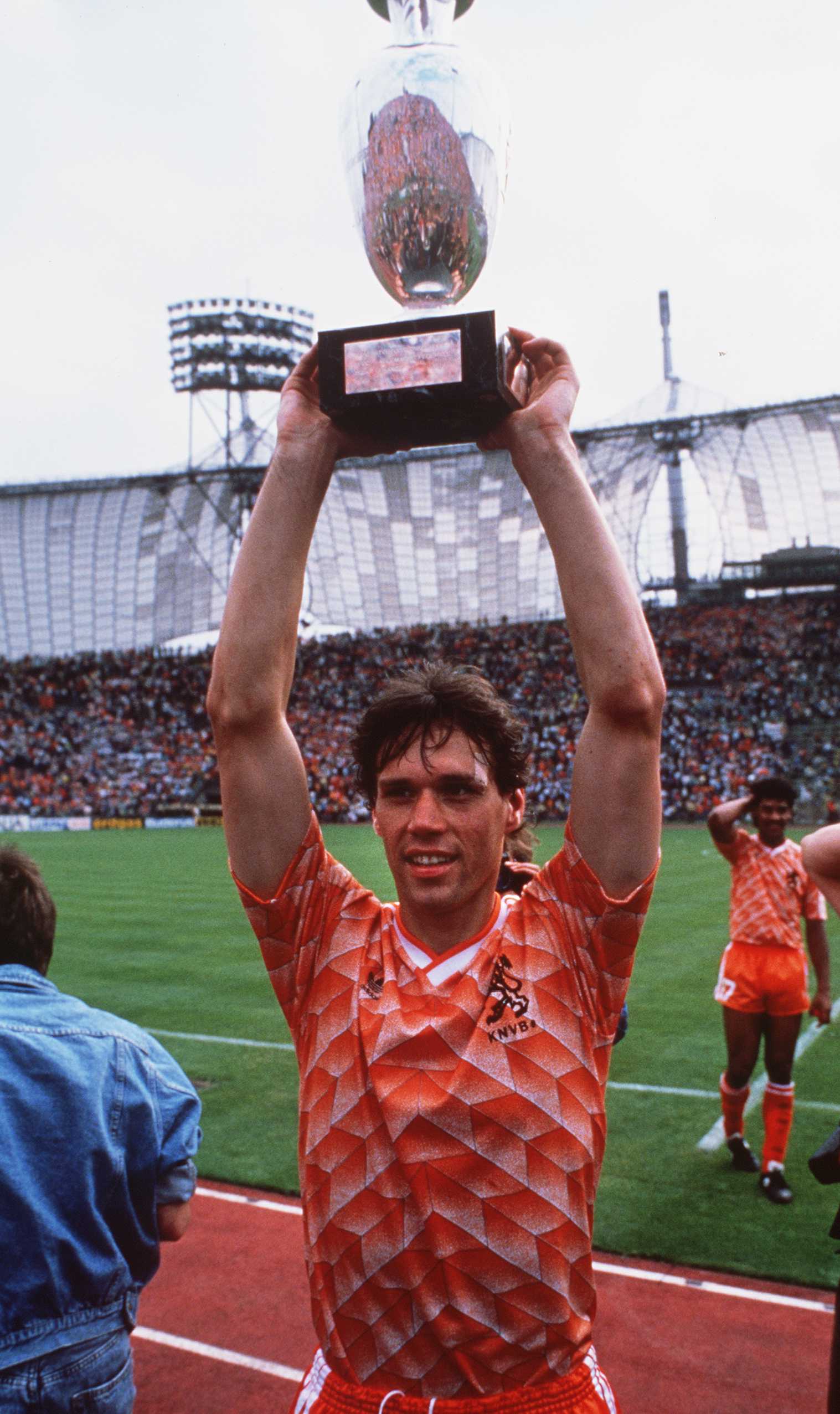
Unlike Kempes, Marco Van Basten had not gone into a major tournament on top form having struggled with injury in his first season with AC Milan. At Euro '88 he would take the opportunity to truly cement his status as one of the most feared strikers in world football.
Holland went into the European Championships with some heavy expectations placed on their shoulders. Along with Van Basten, Ruud Gullit, Frank Rijkaard and Ronald Koeman helped make up the most talented Dutch squad since coach Rinus Michels had taken Cruyff and co. to the 1974 World Cup final.
Van Basten quickly demonstrated he was unafraid of the pressure with a hat-trick against England. In the semi-finals against West Germany he showed he positively thrived on it and scored the winner with two minutes left.
In the final the Netherlands faced the Soviet Union team who had beaten them in the group stage. Van Basten once more rose to occasion and did so with some magnificence. His spectacular volley from an extremely difficult angle on the right-hand side of the box flying into the net to seal a 2-0 win and take Holland's first and still only piece of major silverware.
Ruud Gullit
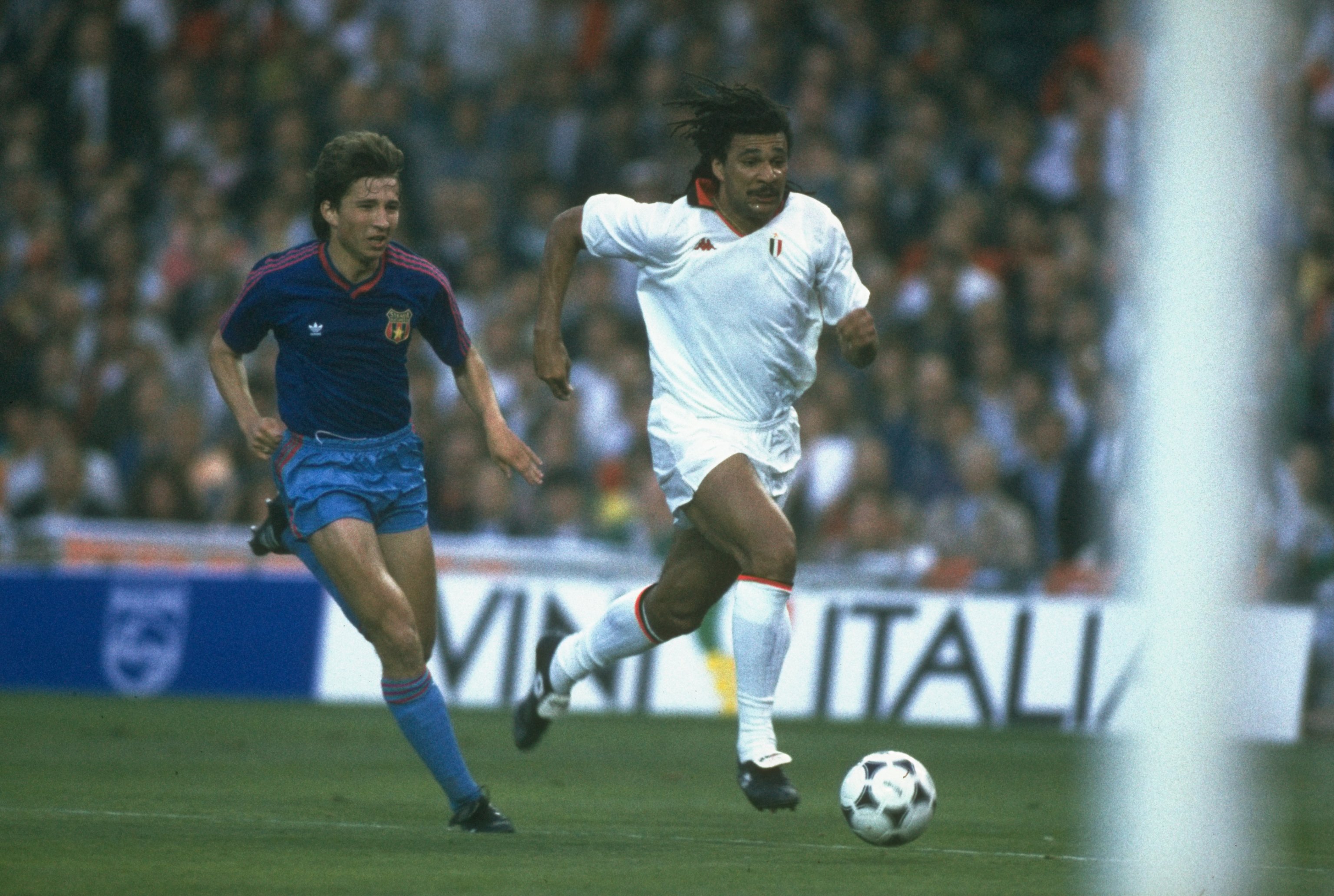
It is hard to separate the contributions both Ruud Gullit and Marco Van Basten made in their shared time for both AC Milan and Holland.
Both scored important goals for club and country in cup finals and consistently proved themselves as two of the best players in the world at the time.
Throughout his career Gullit displayed his quality in the versatility of his game, adept on all areas of the pitch. The importance of his contributions at PSV Eindhoven and Chelsea in helping kick-start successful eras for each club at either end of his own career must not be forgotten either.
Ronald Koeman
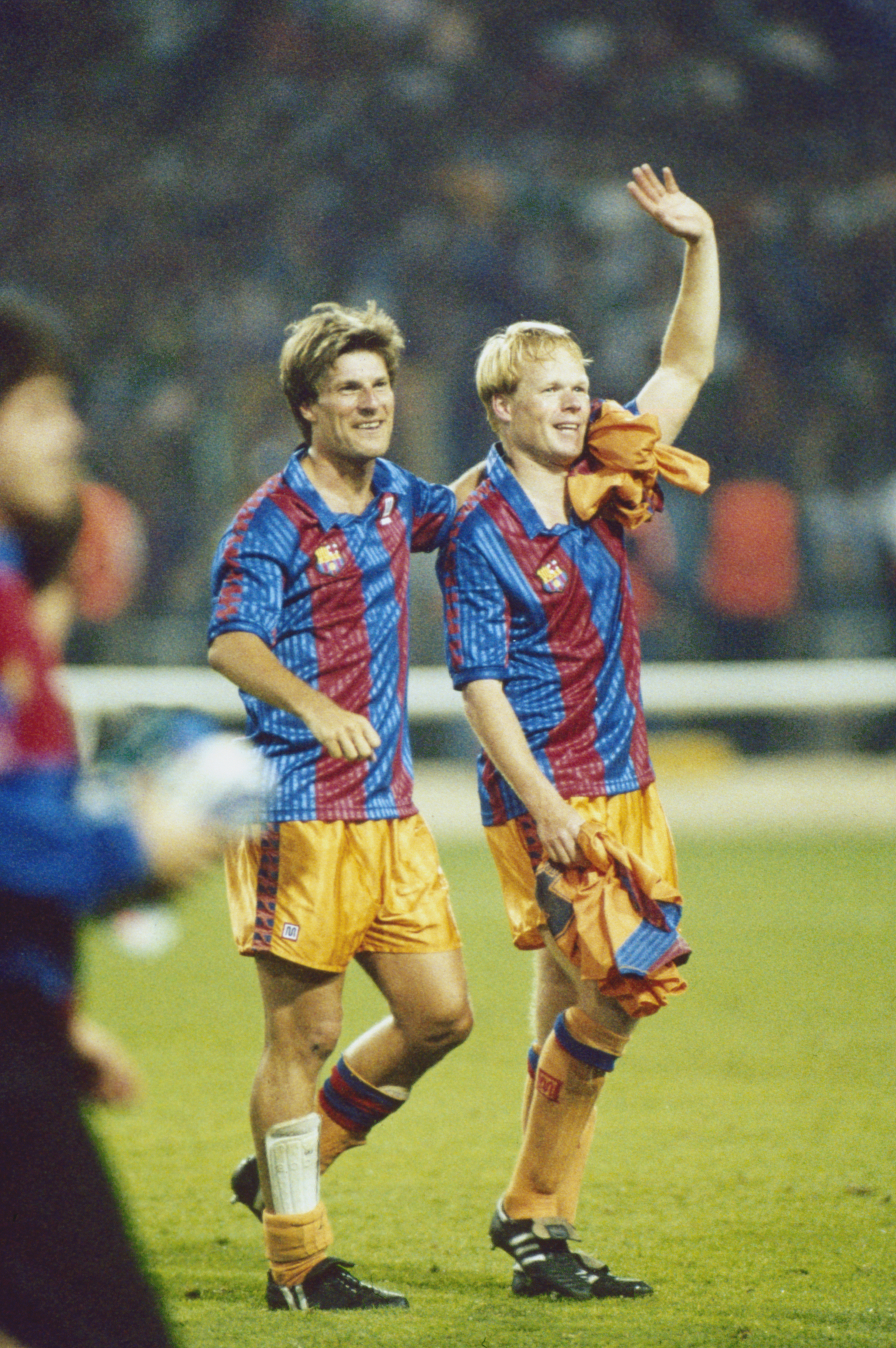
Completing a trilogy of Euro '88 winners is Dutch defender/midfielder Ronald Koeman.
You just have to look at the list of trophies Koeman won to realise how clutch he was, a constant and integral figure in multiple domestic and European successes for three of European football's biggest clubs (not to mention the Euro '88 success).
Having won the Eredivisie with Ajax in 1985 he moved onto PSV Eindhoven and won three consecutive titles from 1987-89. Koeman then bettered that at Ajax with four La Liga triumphs in four years from 1991-94.
If the Dutchman wasn't the most glamorous player at either PSV or Barca's 'Dream Team', he was undoubtedly one of their most important, coming through in the biggest night in either team's history up to that point in both's first European Cup victories.
For the former in 1988 he scored the first penalty against Benfica. Four years later as Barca's final against Sampdoria went into extra-time Koeman struck one of the greatest free-kicks of all time.
Younis Mahmoud
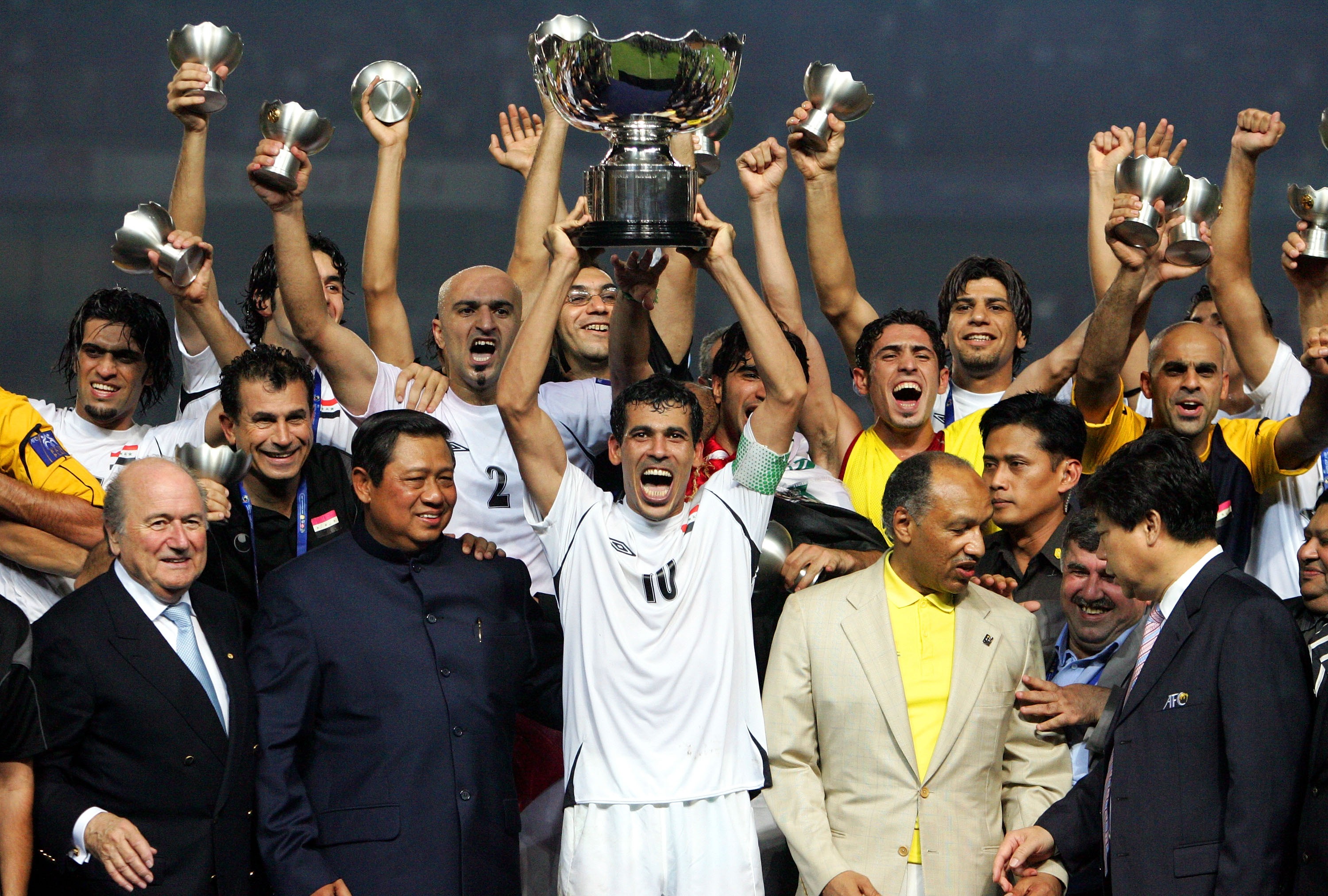
Younis Mahmoud was one of the key men behind Iraq's historic Asian Cup victory in 2007. For Mahmoud and his team-mates they did not carry the expectant burden of a national side fearful of disappointing fans who had travelled to watch them and the millions back home glued to television sets.
Instead they were dealing with a different kind of pressure. This was a team, effectively made homeless by the war going on in their country, who with each win were at least for a little while helping to bring their people together in a shared joy.
As captain Mahmoud was charged with leading his men on the pitch through this, and he responded excellently. Having taken his team through a group stage that had included a 3-1 win over Australia, Mahmoud would score both goals in their 2-0 win over Vietnam in the quarter-finals. Their next triumph, a penalties win over South Korea in the semi-final, was put into sharp perspective by the killing of 50 cheering fans by a suicide bomber back home.
Nothing would compensate for the lives lost in that tragedy, but the team completed one of the competition's greatest upsets to once more unite their people in celebration in the face of those who wished to quieten them.
And it was Mahmoud who completed it. With just under 15 minutes left in the final with Saudi Arabia Iraq swung a corner in and there was their captain, timing his run to perfection at the backpost he headed it in.
Ryan Giggs
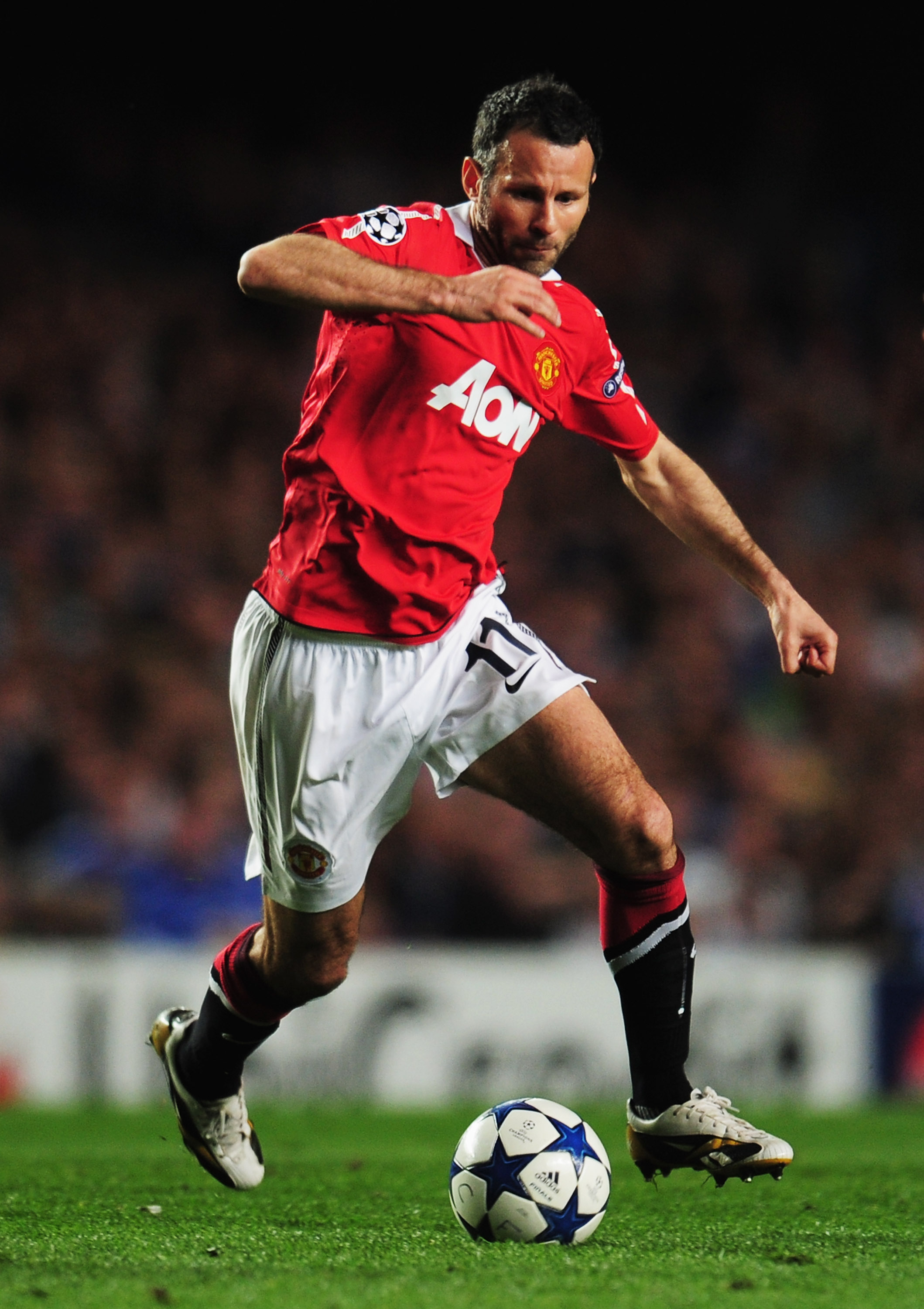
Ryan Giggs' assists in Manchester United's recent Champions League tie with Chelsea were the latest in a long, long line of significant contributions the Welshman has made in making the Red Devils the most successful club in England of the past two decades.
That he is still contributing at an age when many talented players have long ago begun to wither is a real credit to the way he has managed his career and Sir Alex Ferguson's nurturing of him, especially as he has got older.
Giggs remains one of Ferguson's go-to-guys just as much as he ever was, and he has undoubtedly come up trumps for him on many occasions. In their treble winning season of 1998/99 this was certainly the case. His mazy dribble through much of the Arsenal side before smashing it in the back of the net helped see them through to the FA Cup final while his half-scuffed shot in the Champions League final led to Teddy Sheringham's equaliser.
Sandro Mazzola
In an era when Italian football was viewed as primarily playing strict adherence to the codes of catenaccio, Inter Milan's Sandro Mazzola was one of those shining exceptions to the rule.
In truth even catenaccio's most famous practitioner, Inter coach Helenio Herrera, knew that defensive football would count for very little if you did not have creativity up the other end of the pitch. Mazzola was one of Herrera's key components in delivering that for the Nerazzurri.
The Italian international's creative instincts, close control and good finishing was a major reason for Inter's dominant period in the 1960s. He contributed significantly to four Scudetto that decade and his goals were crucial in triumphs outside of Italy.
These included two in their 3-1 defeat of the mighty Real Madrid in the 1964 European Cup and another double in the first-leg 3-0 win in the Intercontinental Cup win against Argentina's Independiente a year later.
Roberto Ayala
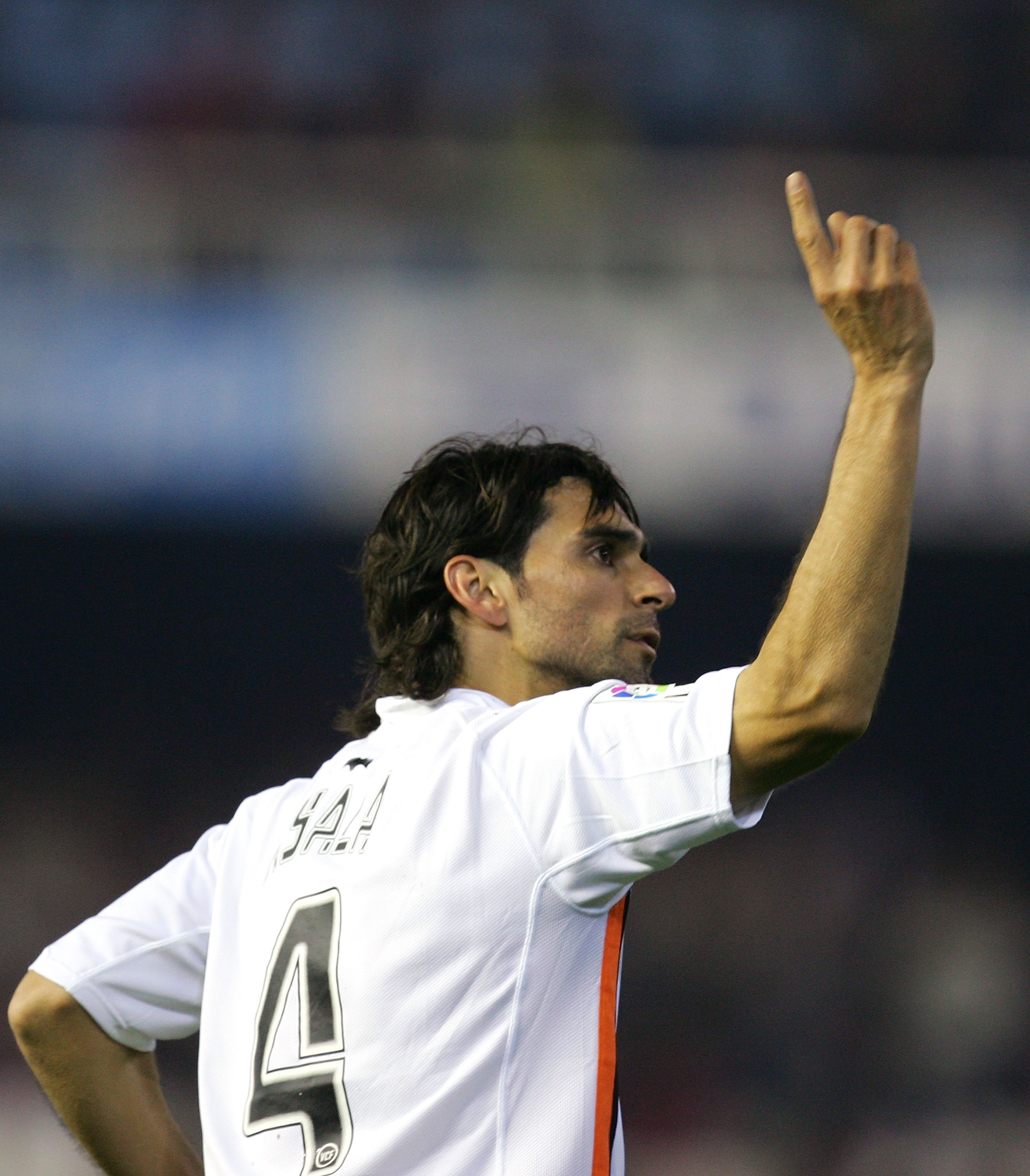
One of the best South American defenders of the modern era, Roberto Ayala was a major factor in the success of Valencia in the first half of the last decade.
That Los Che were able to break up the domination of La Liga by the big two of Barcelona and Real Madrid not once, but twice, was in no small part down to the defensive solidity Ayala helped provide over the course of those years. He was a constant presence in helping Valencia hold off the charges of Spain's usual victors.
It was a defensive dominance that was just as vital in Europe. While they were unable to go all the way in the 2001 Champions League, three years later they went the distance in the UEFA Cup as Ayala helped shut out Villarreal and Marseille in the semis and final.
Antonín Panenka
Antonín Panenka is the only person to make this list for one single penalty. The cheekiness and confidence behind it marks him out as a true clutch player.
Czechoslovakia had drawn 2-2 with West Germany in the final of the 1976 European Championships forcing the game into extra-time then penalties. Uli Hoeneß missed the Germans' fourth spot-kick meaning if Panenka scored his Czechoslovakia would win the tournament.
Naturally this was a high-pressure moment, with the chance to beat the reigning world champions and win your country's first major trophy. Panenka ran up looking as any player about to strike a penalty does.
As German goalkeeper Sepp Maier dived to his left Panenka proceeded to chip the ball into the centre of the net. It has been done several times since, but no player had previously had the guts to do it before Panenka, let alone in such a big match.
Samuel Eto'o
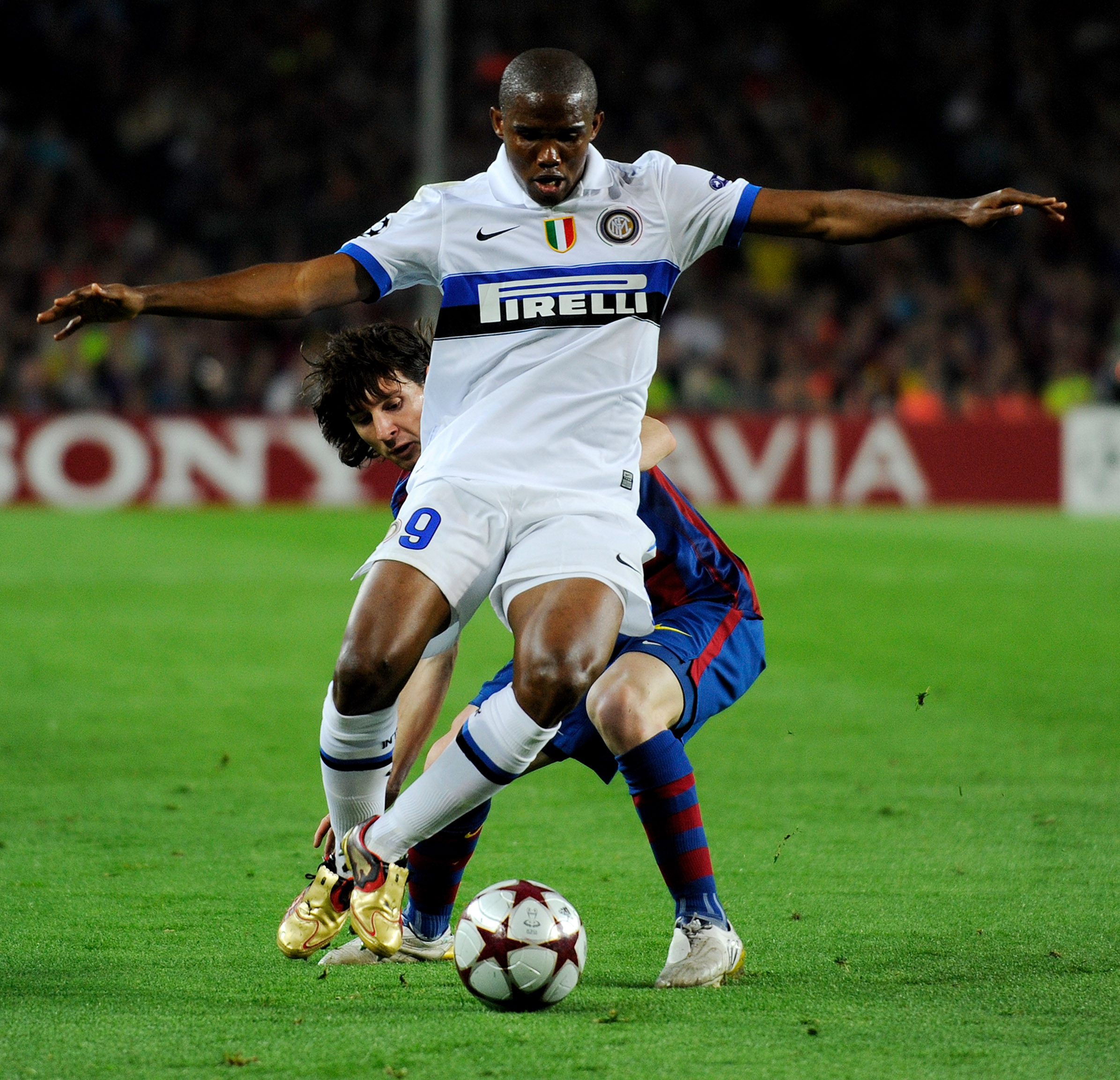
The biggest name in Cameroon football for the past decade, Samuel Eto'o for one reason or another has never been able to quite inspire his country to the achievements of their past. In his day job however, he has played a significant role in the success of two of Europe's biggest clubs.
His goals helped fire Barcelona to three La Liga titles (2005, 2006, 2009) while scoring valuable goals in the course of both their Champions League victories (2006, 2009) including a goal in each of the finals.
Having won one treble already Eto'o moved to Inter Milan and proceeded to win another the very next season. While still contributing goals, under the coaching of Jose Mourinho he also developed defensive, more workmanlike instincts, closing down and tracking back as Inter put in some heroic rearguard displays on their way to their own Champions League crown. One in particular coming against the forward's old club Barcelona in the semi-final!
Roger Milla
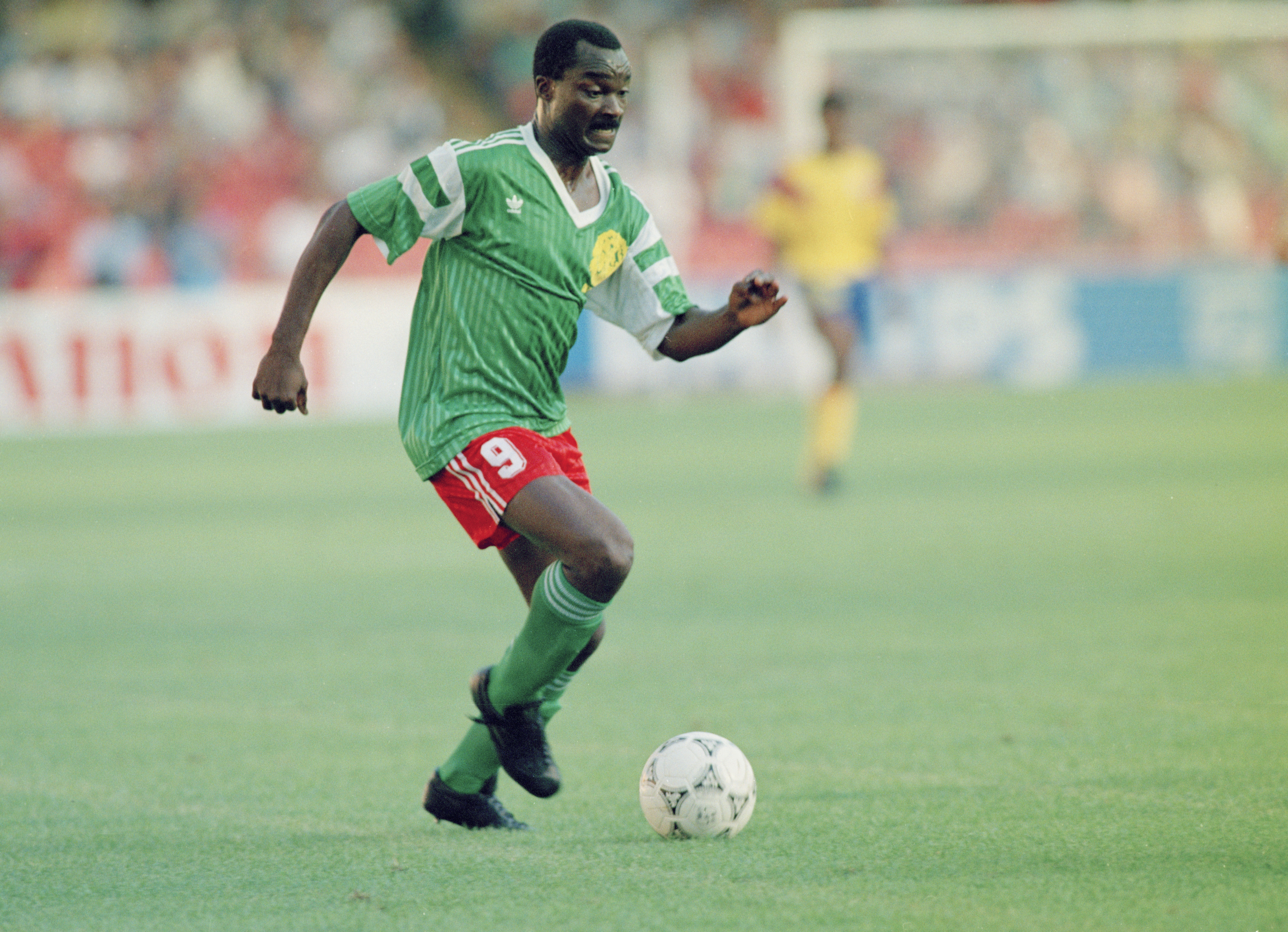
Roger Milla was undoubtedly the inspiration behind Cameroon's run to the quarter-finals of the 1990 World Cup, the best performance by an African side at the tournament up to then and one that Ghana most recently came closest to bettering with their narrow quarter-final loss to Uruguay in 2010.
Having retired from international football in 1987, aged 35, Milla returned to national duty for the 1990 tournament. Cameroon had already upset defending champions Argentina 1-0 in their first group game. In their second Milla came off the bench to score twice in their 2-1 defeat of Romania.
Milla was not done there. In the second round the striker grabbed another two in a 2-1 win over a strong Colombia side.
Cameroon's adventure would end in the quarter-final against England, but not before supersub Milla almost inspired a historic win. He first drew the foul for Emmanuel Kundé's equalising penalty before setting up Eugène Ekéké's goal to give them a 2-1 lead. They were unable to hold on as England won 3-2.
Emilio Butragueño
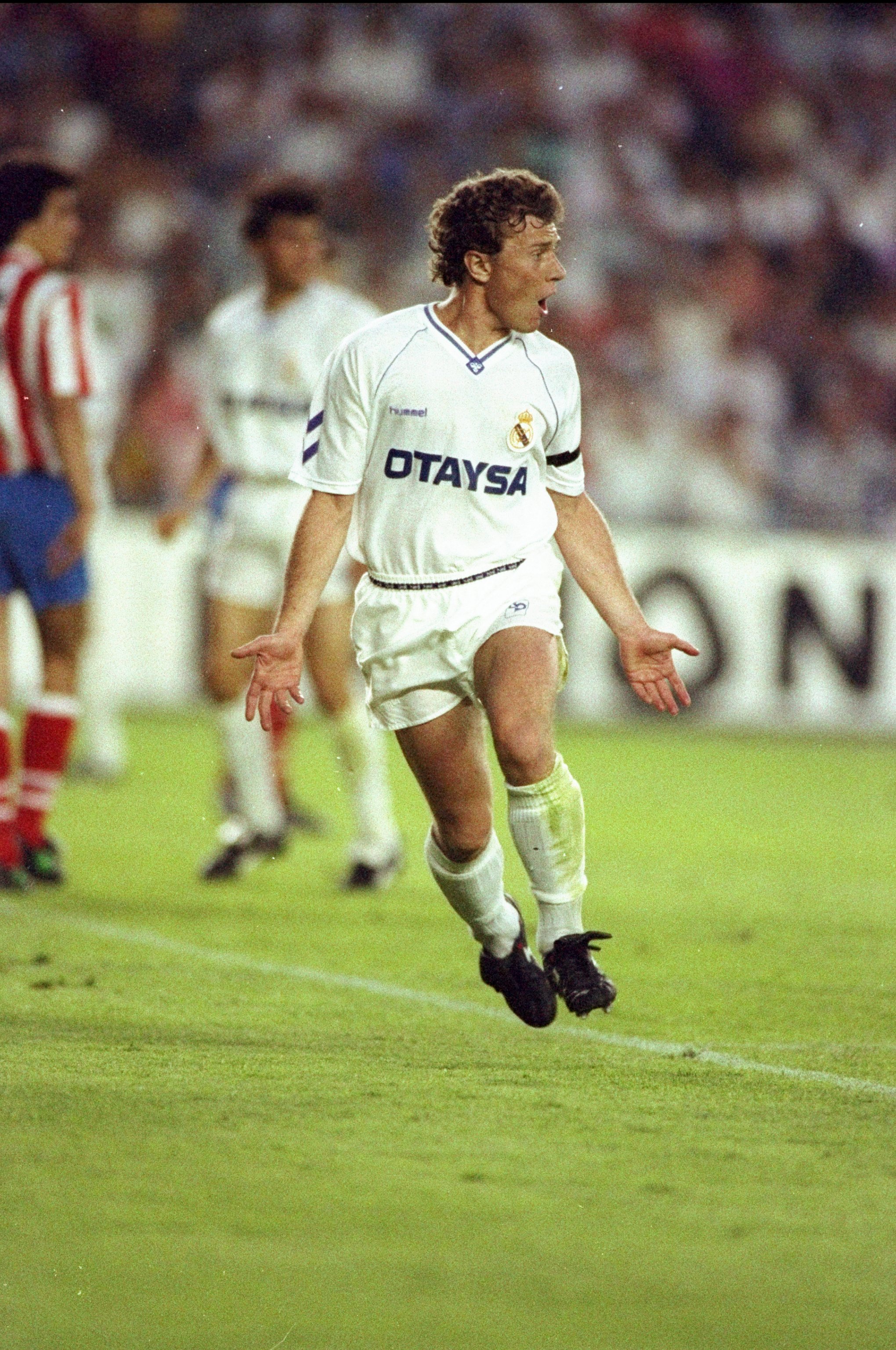
There were other talented, perhaps more glamorous players also behind Real Madrid's renaissance in the 1980s and 1990s but at the heart of that team was Emilio Butragueño, a rock of reliability.
His emergence as part of 'Quinta del Buitre', a quintet of youth products who worked their way into the first team, was a key reason as Real ended a barren period.
Butragueño was skilfull and scored goals, and was a constant presence in La Liga and UEFA Cup winning sides that kick-started the club's second most successful era.
Raúl
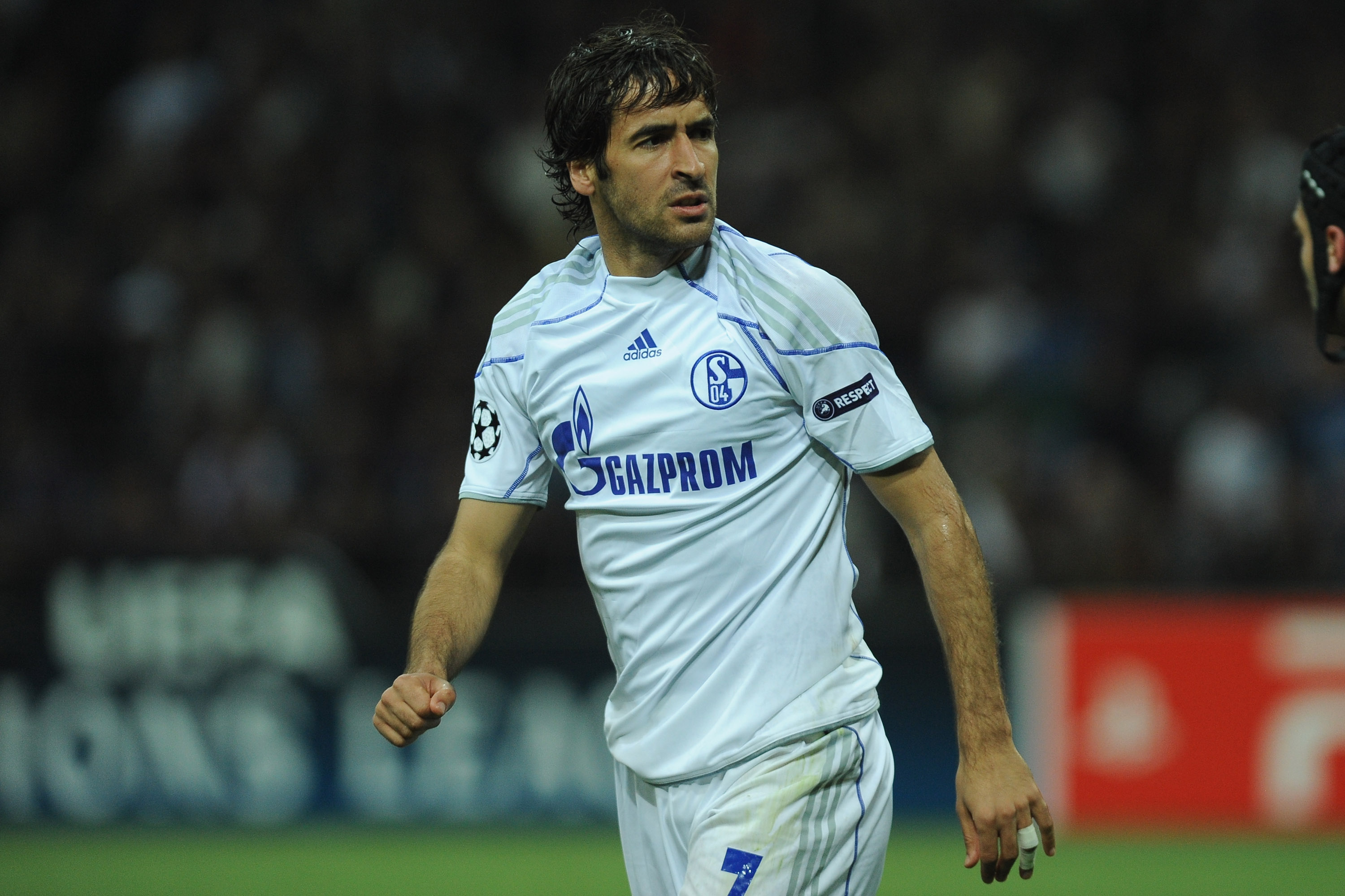
Like Ryan Giggs, one of the great achievements of Raúl's career has been his longevity and continued relevance.
While his new club Schalke 04 have endured a difficult domestic campaign this year, they have enjoyed a surprising run to the semi-finals of the Champions League with their Spanish striker contributing some big goals in their knockout stage victories over Valencia and Inter Milan.
Raúl of course is most synonymous for his sixteen years spent at Real Madrid. A frequent goalscorer, he was one of the club's main weapons in their many battles against Barcelona and a key part of six La Liga wins. He also scored in the finals of their Champions League victories in 2000 and 2002.
Kevin Keegan
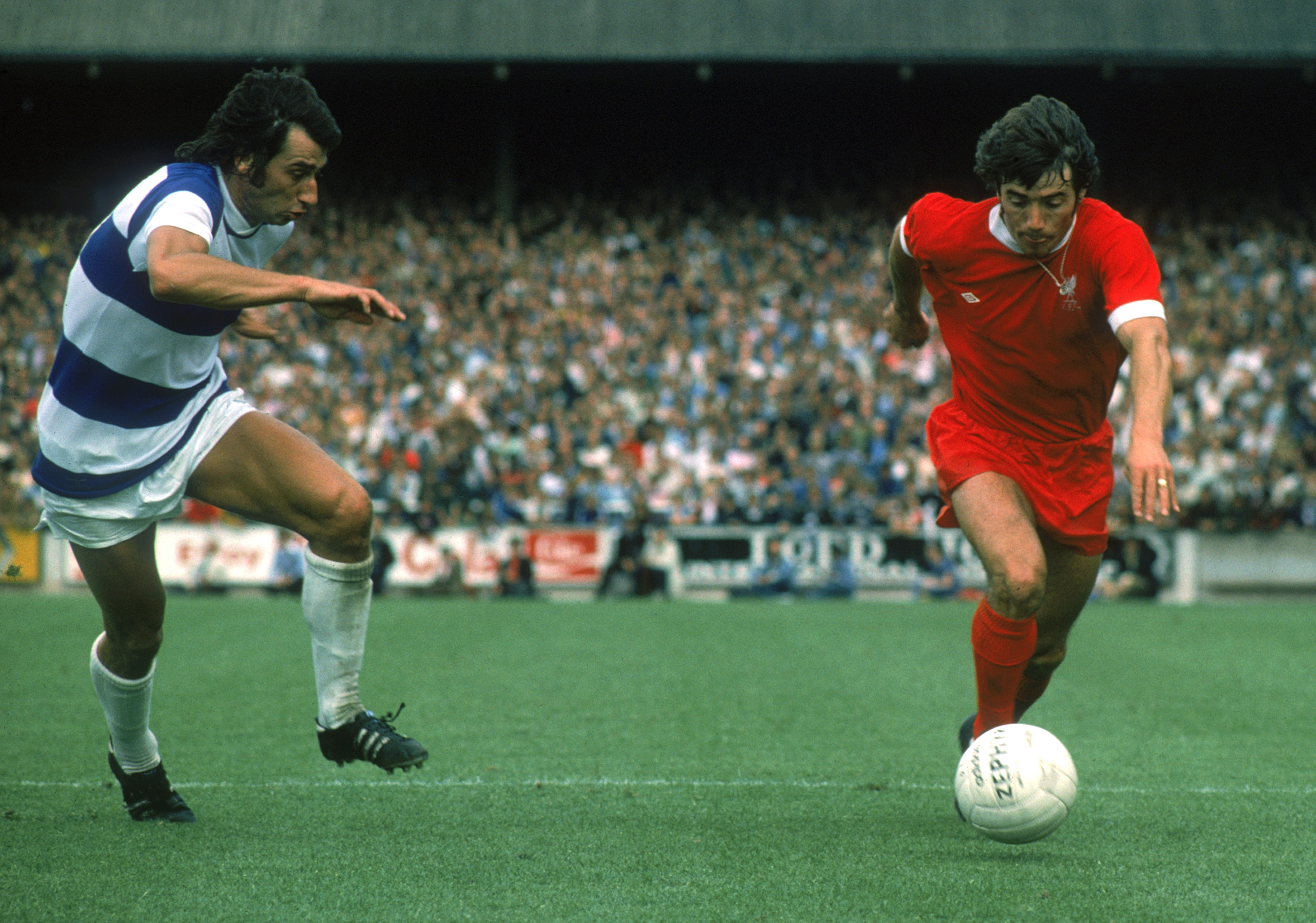
Kevin Keegan is more associated these days with not being able to handle the pressure so well. From walking out on the England manager's job after a 1-0 defeat to Germany in the last game at Wembley to Newcastle United's failure hold onto to what was at one point a substantial lead in the race for the 1995/96 Premier League title.
As a player Keegan was quite the opposite. The two time Ballon D'or winner played a major part in four championship wins at both Liverpool and Hamburg in the 1970s as well as the former's first European Cup. In the autumn of his career he moved down a level to Newcastle and helped take a club and a fanbase desperate for top-flight football back to English football's then Division One.
Keegan was undoubtedly a big-game performer. With goals in Liverpool's UEFA Cup wins of 1973 and 1976 as well as the FA Cup of 1974.
Zico
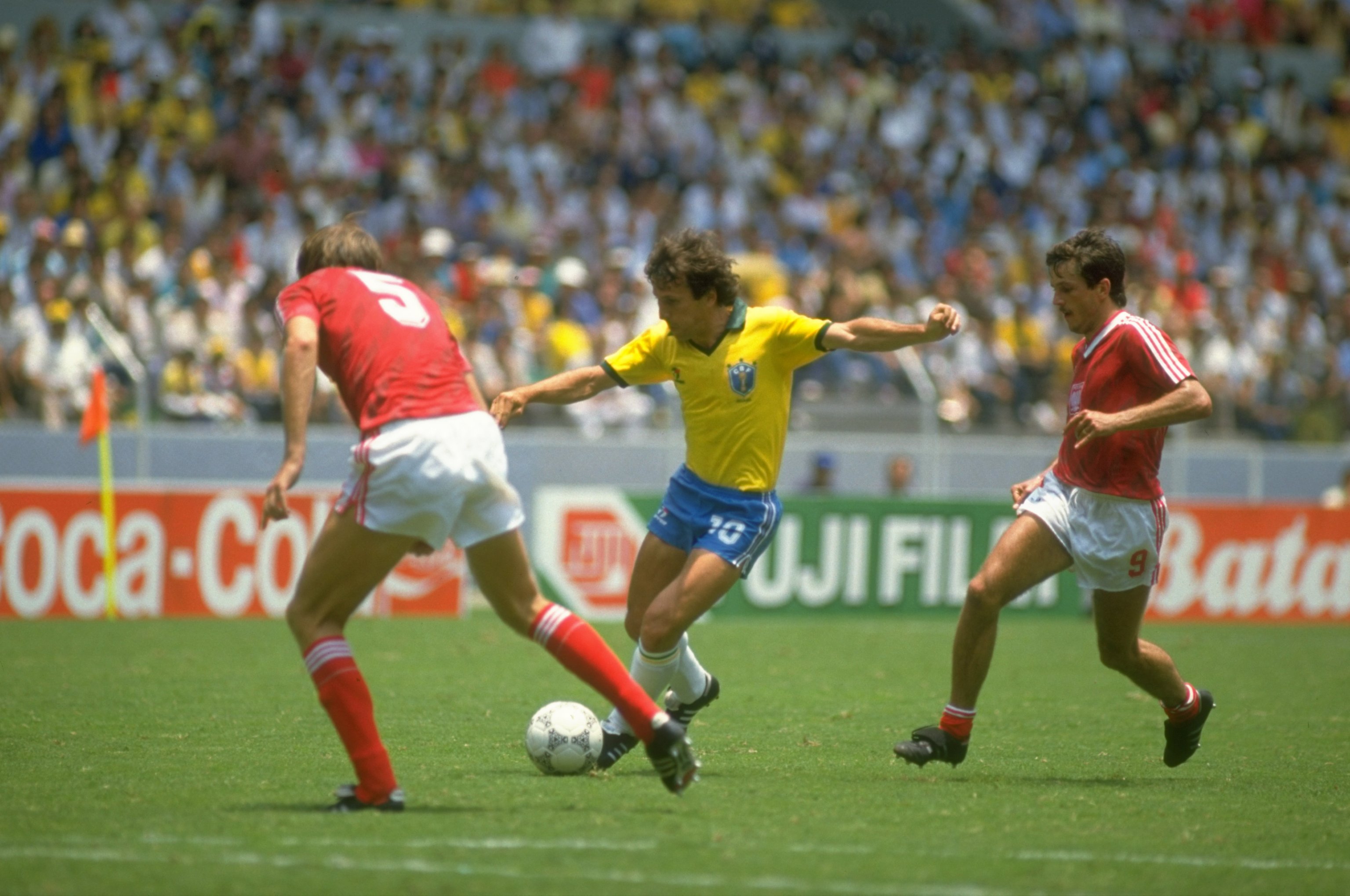
Zico was never so fortunate as to taste World Cup success with Brazil. Besides what many football fans view as the travesty that was the 1982 side not winning that year's competition, in his two other World Cup experiences Brazil were plainly not as good as others.
One of soccer's greatest ever playmakers, Zico did however get to play a major role in Flamengo being one of the world's best teams in the early 1980s.
The man known as the 'White Pele' was a fabulous passer and finisher of sublime technique. These attributes throughout Flamengo's Copa Libertadores campaign of 1981, and in particular in two great final performances.
Against Cobreloa, Zico scored twice in a first-leg 2-1 win. After their Chilean opponents forced a playoff with a 2-1 win of their own Zico stepped up to settle matters once and for all with a goal either side of half-time in a 2-0 win.
This victory earned them a chance to play Liverpool in the 1981 Intercontinental Cup. Zico would not score in this game, but produced a man of the match performance as his side dismantled the European champions 3-0.
Franz Beckhenbauer
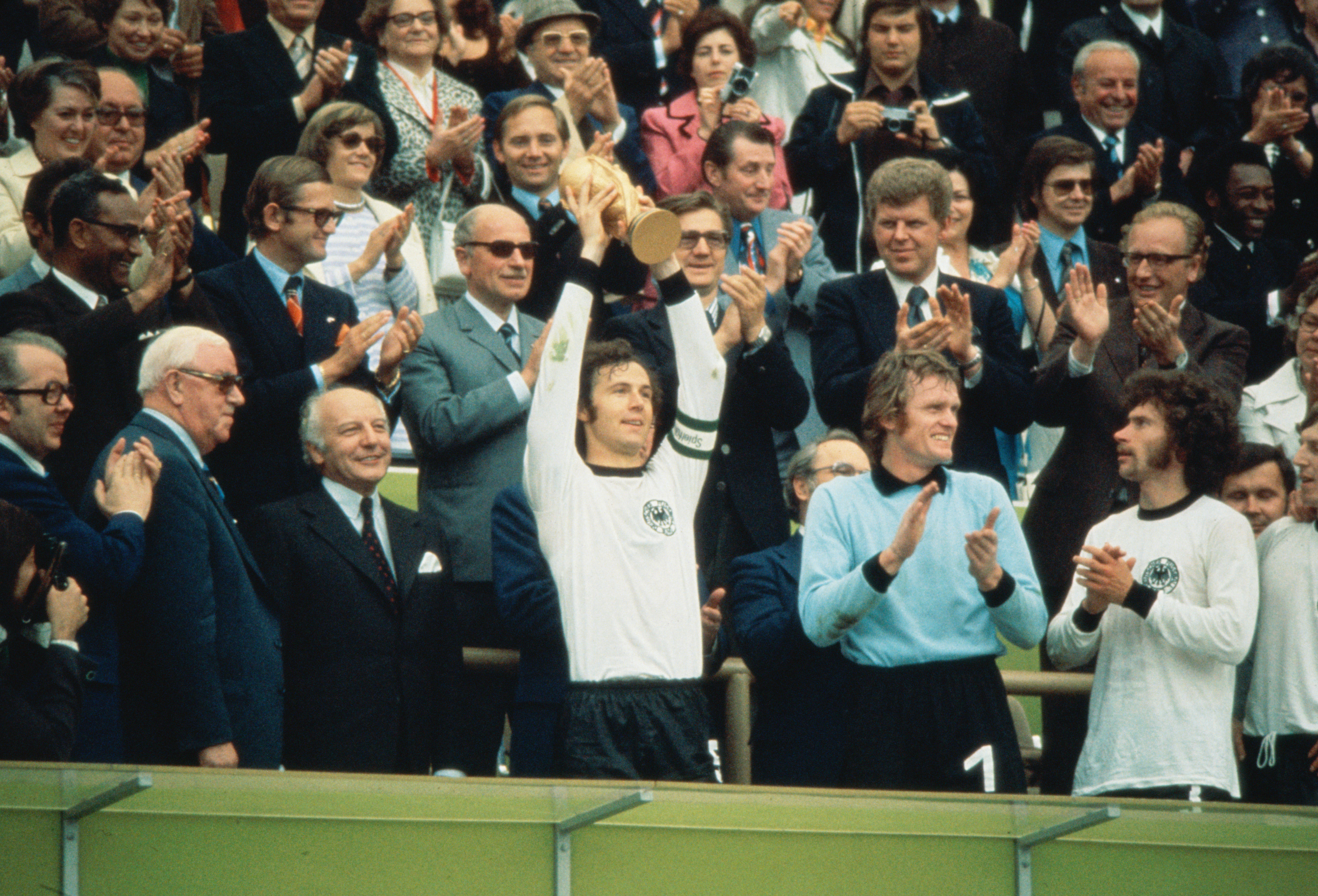
Franz Beckenbauer won virtually everything he could as a footballer. Bundesliga titles and European Cups with Bayern Munich, international tournaments with West Germany and even NASL championships with New York Cosmos.
Confident, composed and elegant, whether from in midfield or as a sweeper, his play allowed others to go forth and score most of the goals that won those trophies. 'Der Kaiser' was fundamental in getting the ball and facilitating them so they could do so.
His incredible trophy haul speaks volumes for the consistency in which he applied this in big games throughout his career.
Gerd Müller
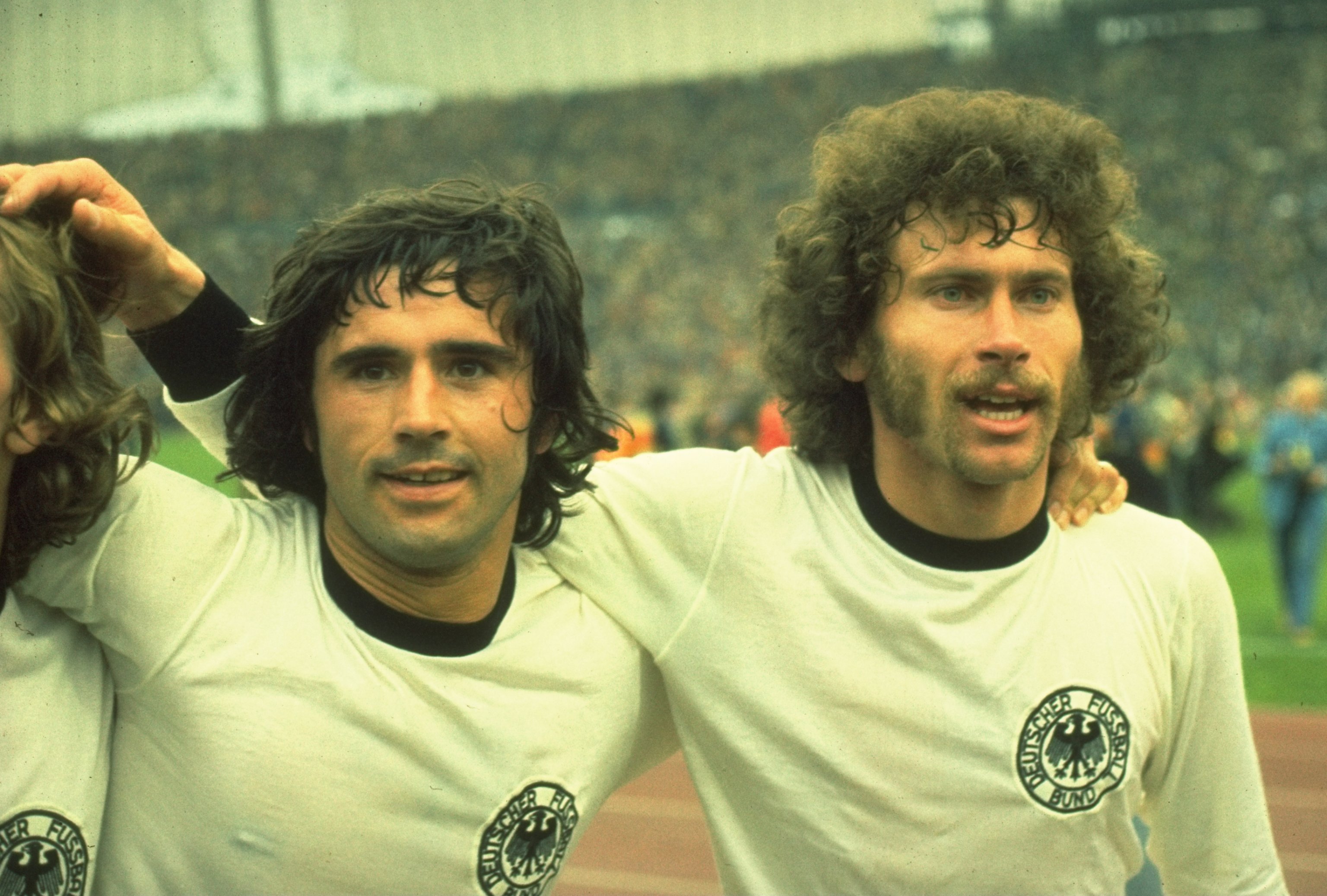
Gerd Müller was one of those to benefit from Beckenbauer's work. But 'Der Kaiser's' efforts would have mattered little if the likes of 'Der Bomber couldn't do their job in the opposition penalty box. Fortunately for Franz, his team-mate of club and country did this consistently.
Müller too was very much a big-game player, thriving as much on those occasions as he did in more ordinary fixtures. The striker scored three times in the group stages of the 1974 World Cup before he delivered the knockout blow to the much fancied Netherlands in the final.
He replicated this in two European Cup finals for Bayern Munich in 1974 and 1975, and while he did not do so when they completed a three-peat a year later, he scored three times over two legs to get past Real Madrid in the semi-finals.
Ricardo Carvalho
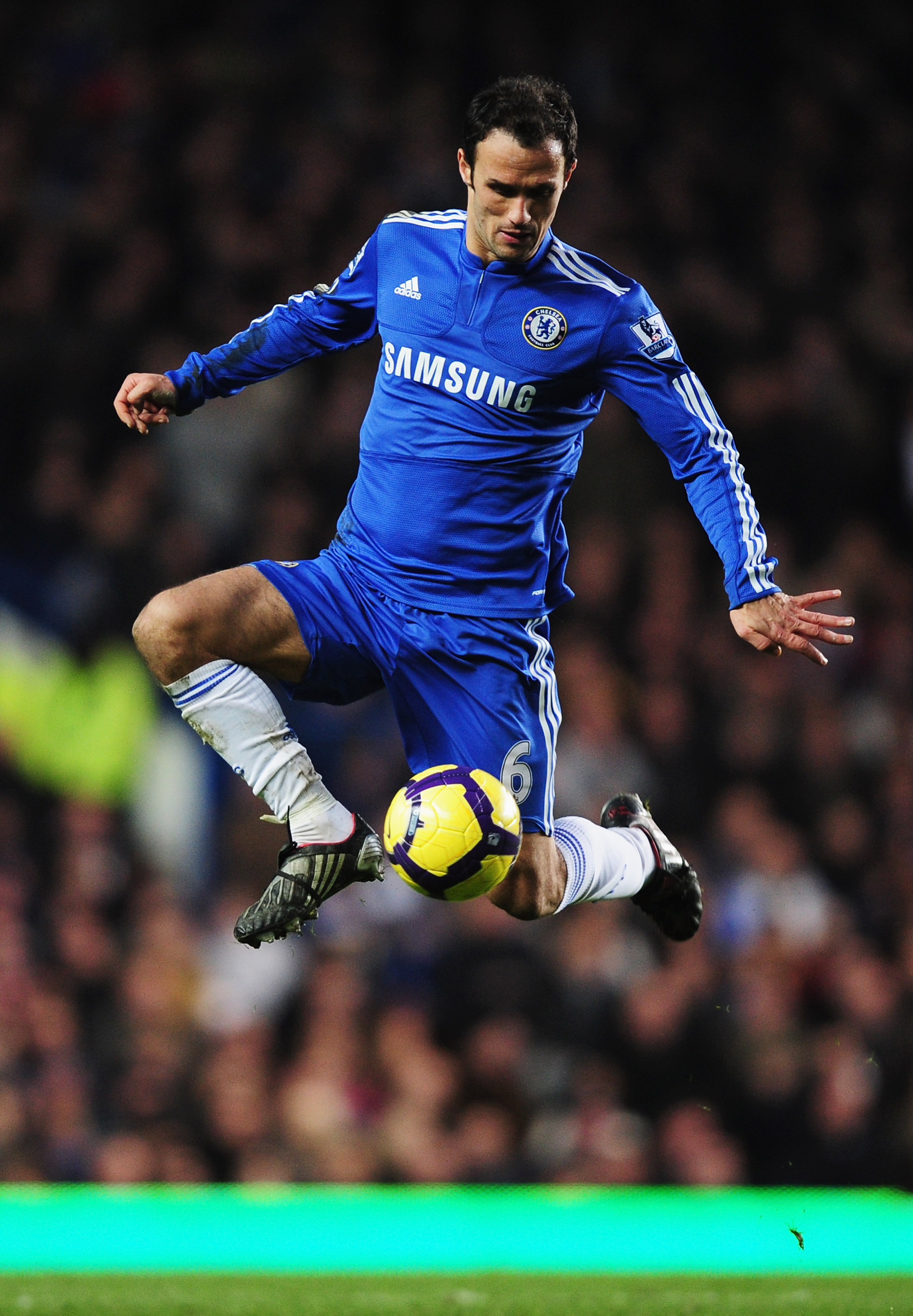
One of the most underrated defenders of the modern era, Ricardo Carvalho has made a career out of dependability.
Jose Mourinho has built two title winning sides in two different countries on this attribute. While at Chelsea John Terry may have got more headlines out of the defensive pairing, Carvalho quietly got on with his job in forming one of the most solid defences of the past decade.
If Terry was not there or had indeed been beaten, Carvalho more often than not was. It was the same at Porto on the run to the Champions League that made a big name out of many of that side and the 32-year-old defender is currently doing similar at Real Madrid.
Jimmy Glass
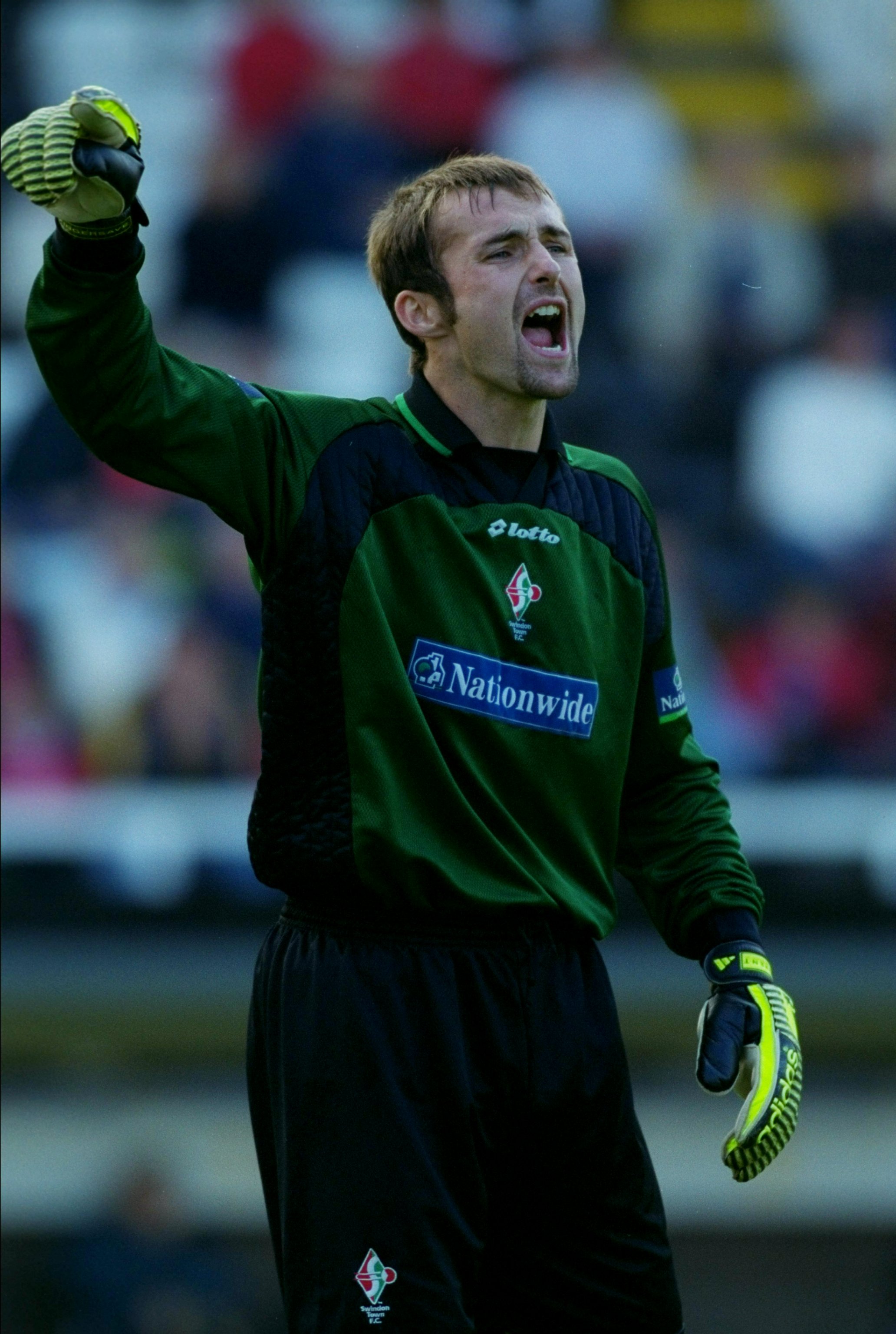
If there is a fine line between triumph and disaster, rarely has it been tread so memorably than by a journeyman English goalkeeper by the name of Jimmy Glass.
Now a taxi-driver after retiring, Glass entered English football folklore in 1999. On loan at the then Division Three side Carlisle United, his team needed a win on the final day of the season to avoid relegation out of the Football League and into Conference football.
Playing Plymouth Argyle with the score 1-1 going into stoppage time, Carlisle had a corner for which Glass ventured forward. After Scott Dobie's header was saved by Argyle goalkeeper James Dungey, the ball fell to Glass who drove the ball into the net and avoid relegation for Carlisle.
If you need to measure the importance of this goal, the team it consigned to relegation, Scarborough F.C., could not regain their league status and went out of business in 2007 with huge debts.
Pelé
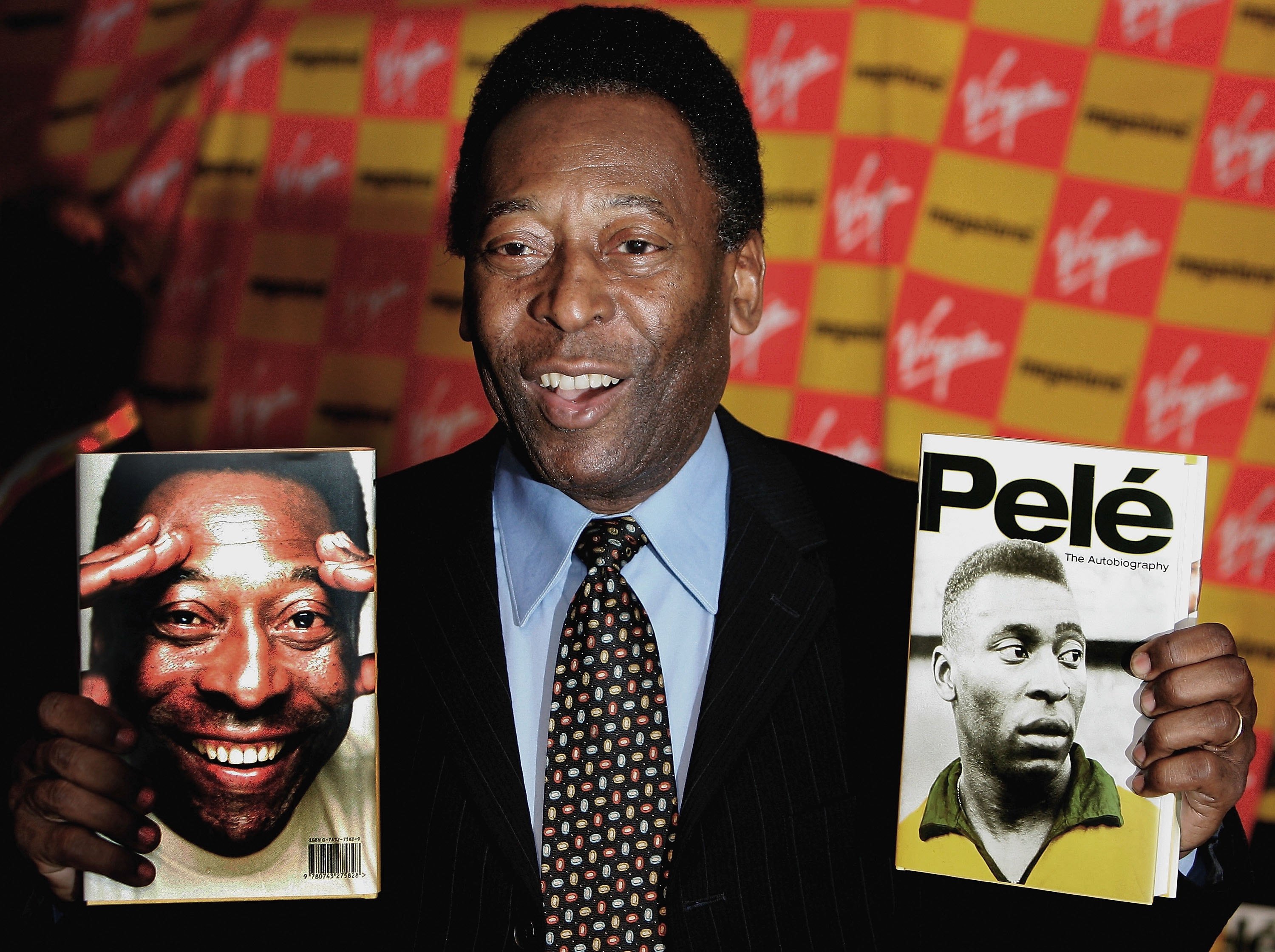
As the man many view as the greatest man to ever play soccer, a list of the 50 most clutch players of all time cannot not be completed without Pelé.
Pelé was a pivotal part of two of the great World Cup winning Brazil squads of 1958 and 1970. The latter coming after he had been battered and bruised to ineffectiveness in 1966, he proved he was world class in Mexico as part of the team that helped define 'the beautiful game'.
If sometimes his career at Santos gave off the impression of travelling circus, with their constant touring and exhibition games throughout the world, it is an opinion not in keeping with the facts. This was a team who won two Copa Libertadores' in 1962 and 1963 who then in those same years proceeded to beat the Benfica and Milan sides of Eusebio and Gianni Rivera respectively to win two consecutive Intercontinental Cups.
Naturally Pelé was at the heart of each of these victories.
Marco Tardelli
Marco Tardelli earns a place on this list for a goal that was the pure embodiment of the great clutch moments so many of the players here have provided.
In the 1982 World Cup final, the Italian midfielder scored the second and somewhat decisive goal in a 3-1 win over West Germany. His ensuing celebration was a salute to embracing the ecstasy of such moments. In soccer, none come bigger than a World Cup final.
And it wasn't a bad goal either!
Renato Cesarini
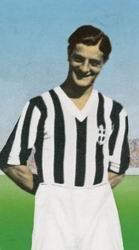
Renato Cesarini is by his name the very definition of clutch. Well in Italy at least.
Cesarini was an Italian footballer of the 1920s and 30s who played for Juventus and the national team. Due to the frequency with which he scored decisive goals in the late minutes of games, that period of the game has became known in Italian football parlance as the zona Cesarini.
Whereby a goal scored in the dying moments of a game is often referred to as being scored in the 'zona Cesarini.'